

























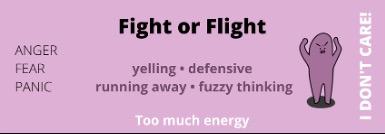
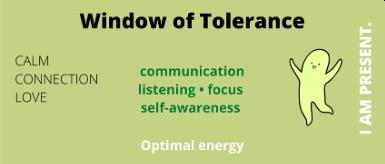




•
• Focus tools
•
• doodling or drawing
•
•
•




















Everyone must turn in a question paper at the end of each lesson
No question? Write something you learned!
• Do not write your name* (or anyone else’s name)
• Do not take anything out of the Question Box (or read from anyone else’s question paper)
• Do not submit any personal questions (about peers or instructors)


Answer the questions quietly on your own , and raise your hand when finished

The survey is anonymous and will not be graded If you don’t know an answer, guess or select “not sure”


•



Each


• Honesty
•

•
•
• Generosity

Think about whether you AGREE or DISAGREE with each statement and why Think
• There are no “right” or “wrong” answers –everyone has their own opinions and feelings
• Remember our Group Norms –listen respectfully when peers are sharing


• Pick a side! – there is no “middle” option, but you can volunteer to explain yourself






People should be in love before doing anything sexual together.






Examples of trusted adults may include:
• Parent, mom, dad, stepparent, grandparent, guardian, foster parent, friend’s parent
• Older sibling, cousin, aunt, uncle, family friend
• Mentor, coach, tutor, advisor, club leader
• Teacher, principal, aide, social worker
• Doctor, nurse, counselor, therapist
• Neighbor, caregiver, community leader




• Choose a trusted adult in your life (age 18 or older) who you feel comfortable talking with
• Interview them – use the worksheet as a guide to ask questions, listen to their answers, then write a short reflection about your conversation
• After each “Talk,” ask them to sign the worksheet
• Talk #1 due: _________
• Talk #2 due: _________
• Talk #3 due: _________





• Timing is key – try when they are not busy or distracted
• Give a heads up – let them know you would like to talk, ask them to set aside time later
• De-personalize sensitive topics – may help to talk about a friend or something in the media
• Start simple – work up to harder questions
• It’s OK to feel nervous –they probably do too!













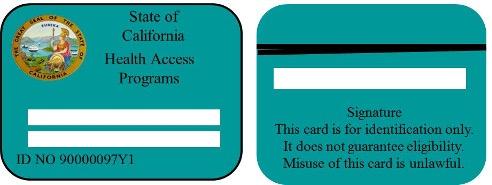




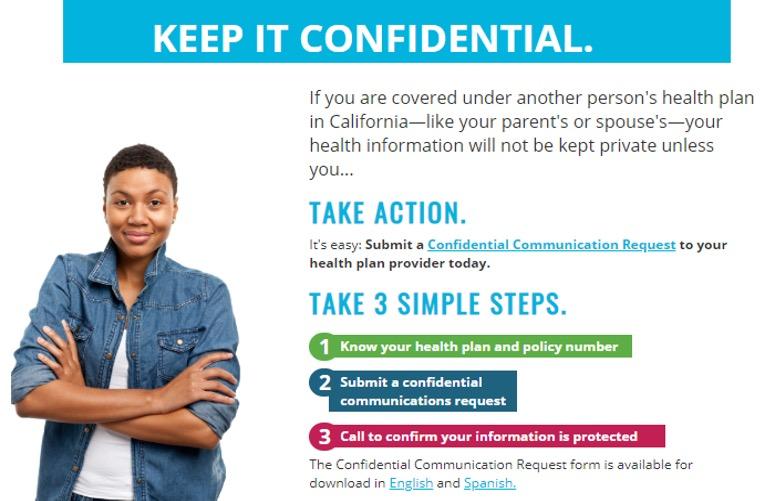










• What did you learn about California laws today?
• What did you learn about your personal values?
• How many local clinics can we name as a class?

• Overview of all body systems
• Intro to sexual development
• Diagrams of pelvic anatomy (internal & external genitals)
• Discuss stages of reproduction (from conception to birth)
Self-Care Ideas:
Draw or build something
Take a walk or nap
Listen to music or a new podcast
Write a letter to a friend or relative







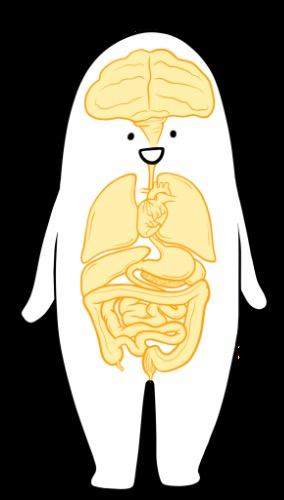







brain, spinal cord, and nerves
• Brain (control center) sends signals to all other body systems
• Can activate our survival response (fight, flight, or freeze)
• Nerves transmit information to/from our surroundings
• Controls movement (voluntary & automatic)
• Perceives sensations (like pain & pleasure)


white blood cells, skin, lymph nodes, spleen…
• Heals the body and repairs damage from injury or illness
• Defends the body against harmful pathogens
• White blood cells attack and destroy germs to keep us healthy
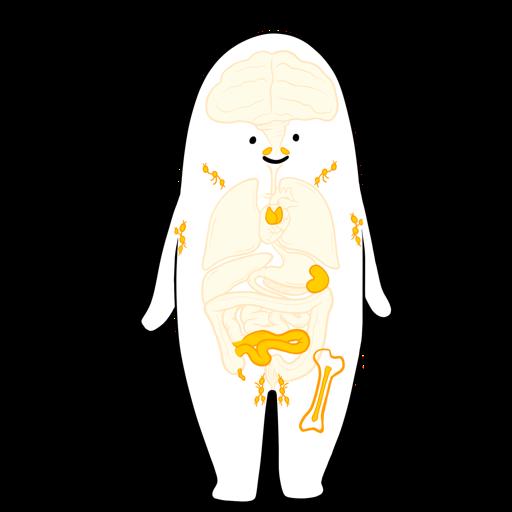

mouth, stomach, liver, intestines, rectum…
• Breaks down food to supply the body with energy
• Creates, stores, and removes solid waste (feces)
• Vulnerable to certain sexually transmitted infections (STIs)
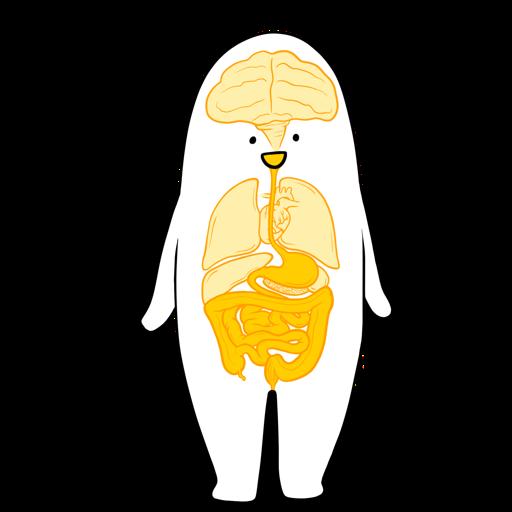

hypothalamus, pituitary, thyroid, testes, ovaries…
• Produces hormones (chemical messengers) that influence other bodily functions:
• Regulating emotions
• Puberty changes
• Processes related to reproduction (ovulation, menstruation, sperm production)
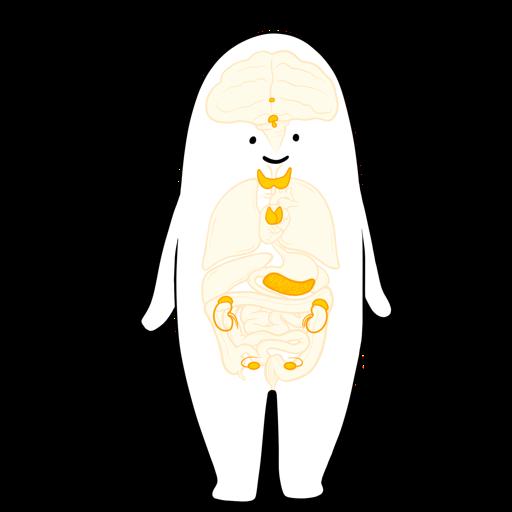

kidneys, ureters, bladder, and urethra
• Filters toxins from bloodstream
• Removes liquid waste (urine)
• Vulnerable to urinary tract infections (UTIs) and certain sexually transmitted infections (STIs)


uterus, ovaries, vagina , penis, testicles, prostate…
• Enables sexual development pleasure, and reproduction
• Hormones from the ovaries or testicles cause puberty changes
• Genitals contain nerve endings that contribute to orgasm
• Sperm and egg cells allow us to create new humans















•






Sexual Development
Why doesn’t everyone have the same sexual & reproductive system?
Sexual reproduction enables the survival of our species
Sexual pleasure facilitates emotional regulation and bonding

Sexual Development
Some of our most significant biological differences are established before we leave the womb…
1) Sex determination: the body’s “blueprint” for development

Sex Assigned at Birth
Categorization of a newborn’s sexual and reproductive biology (mostly based on their external anatomy)
Some bodies align with the medical definition of “female” or “male”… …and some bodies differ from these expected patterns

Sexual Development
How do our bodies develop different sexual & reproductive systems?
Primary sex characteristics develop before birth
Secondary sex characteristics develop during puberty

Sexual Development
Some of our most significant biological differences are established before we leave the womb…
2) Sex differentiation: the process of developing physical traits

Sex Assigned at Birth


















Why do you think this practice is no longer recommended?
• Lack of informed consent
• Medically unnecessary
• Human rights violation


• NO two human bodies look and function exactly the same!
• There is significant diversity in human anatomy, even among bodies given the same label
• Appreciate and respect human bodies
• Our body systems interact and collaborate in incredibly complex ways to maintain our health and body



















Label each body part as we explore the anatomy diagrams together.
These are simple drawings of two common ways that human bodies may develop, often called the male body and the female body.
Keep in mind that every human body is unique!




sperm cell

• Each sperm cell contains half the DNA needed to reproduce
• It’s one of the SMALLEST cells in the human body
• Roughly 525 billion sperm cells made in a lifetime!






sperm cells testicles
epididymis
vas deferens
seminal vesicles
prostate gland
Cowper’s glands
urethra
bladder
penis foreskin scrotum
anus mons pubis


sperm cell
When do people start and stop making sperm?
Sperm production begins during puberty and continues for the rest of a person’s life

We’re

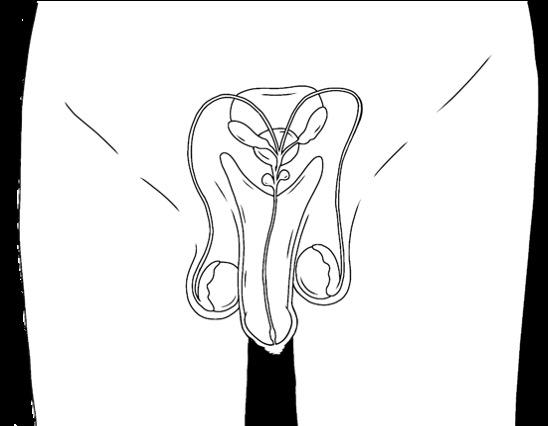


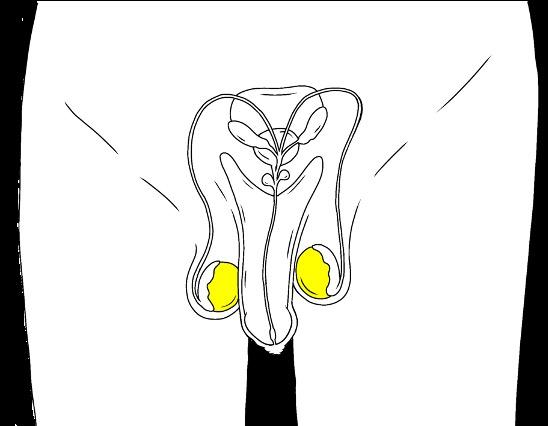
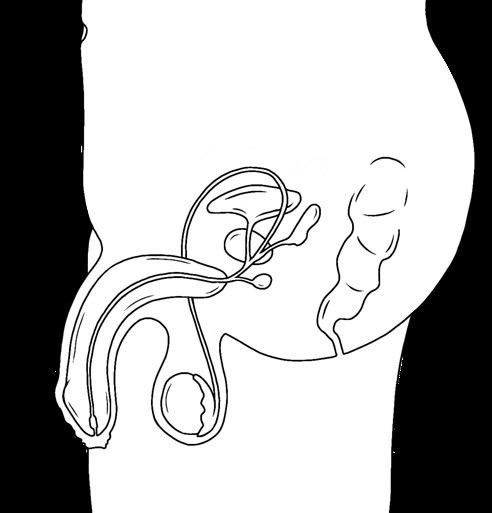




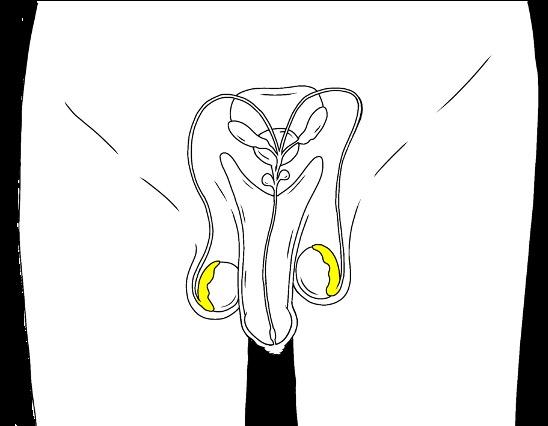
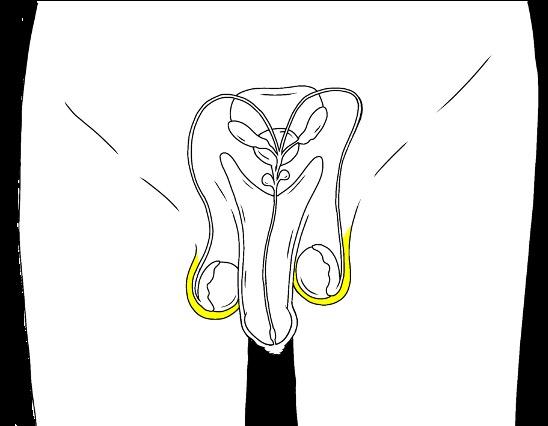
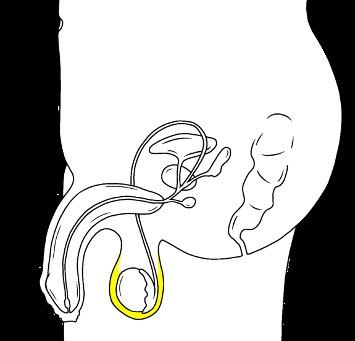


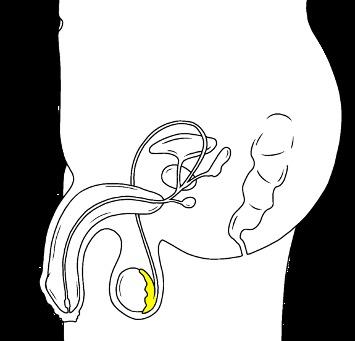


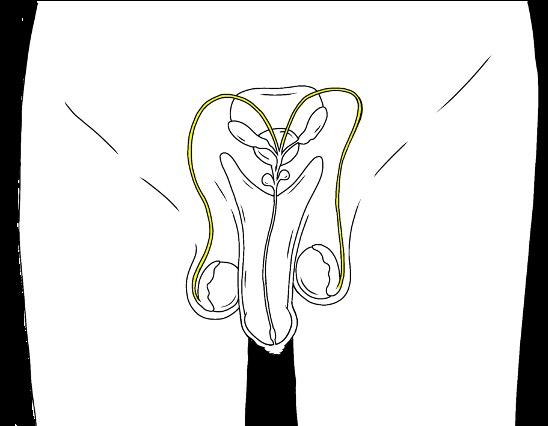
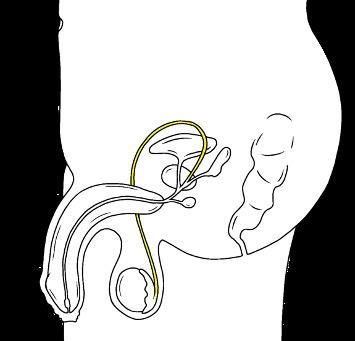



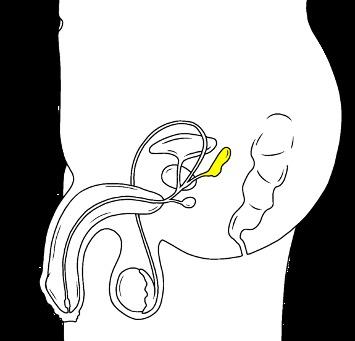



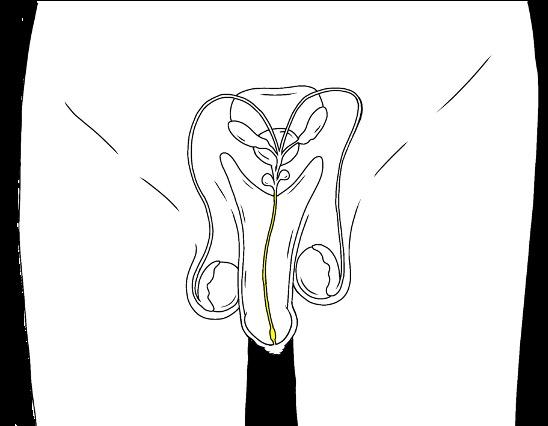
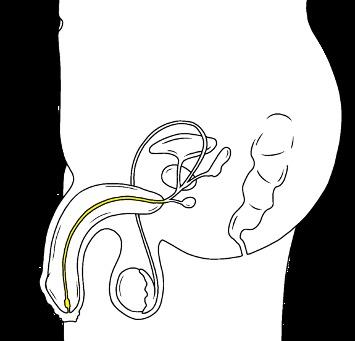


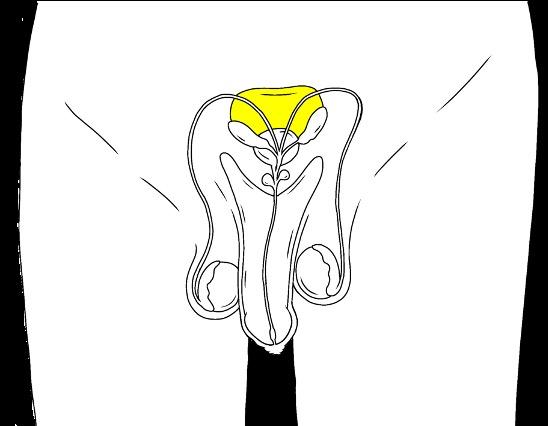
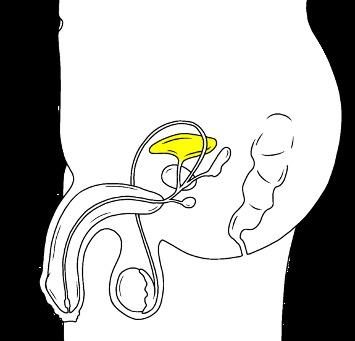






Besides







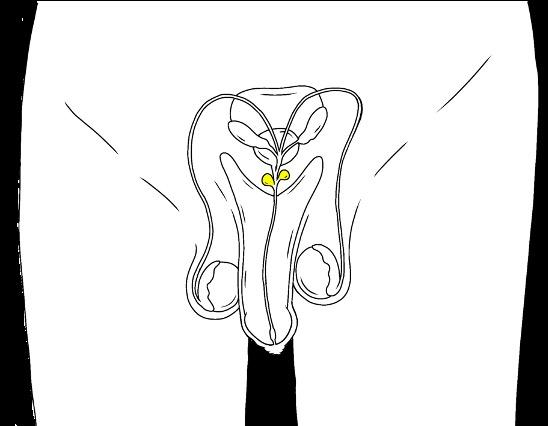







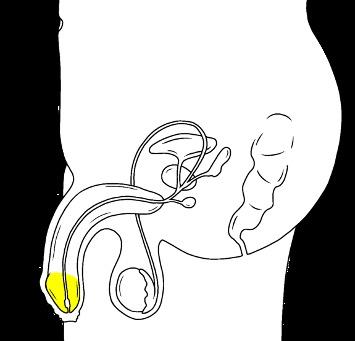


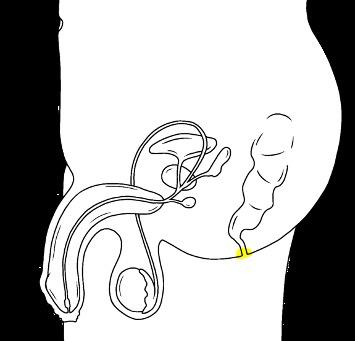

































Anatomy








• Each egg cell contains half the DNA needed to reproduce
• It’s one of the LARGEST cells in the human body
• Roughly 1-2 million egg cells made in a lifetime!

We’re
We’re



Anatomy Assigned Female

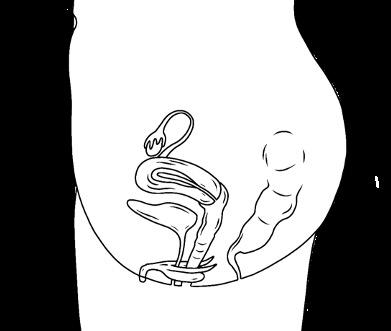








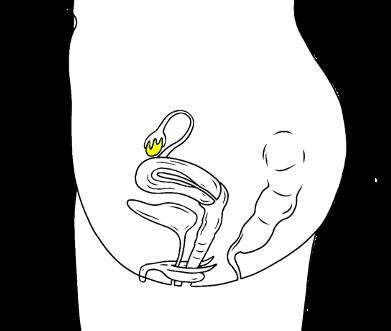


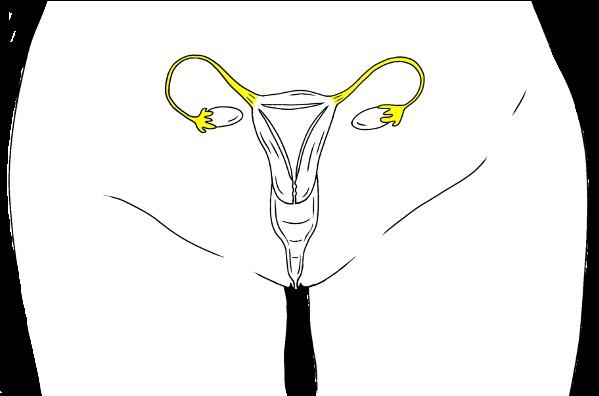
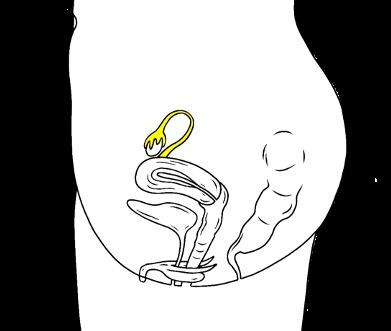


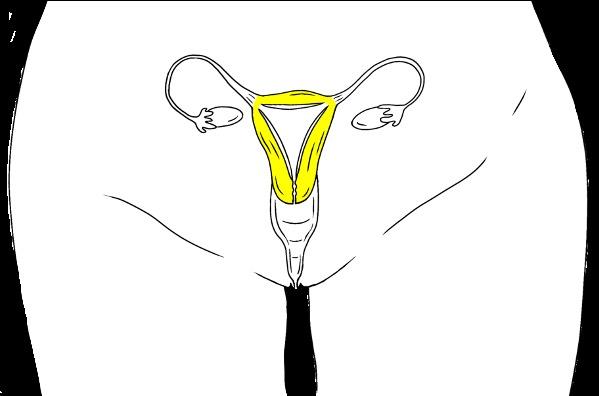
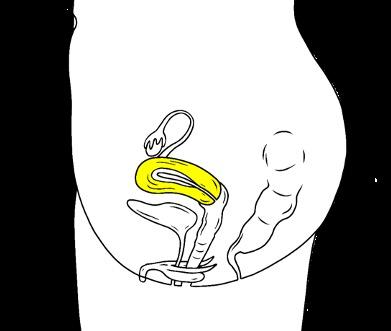










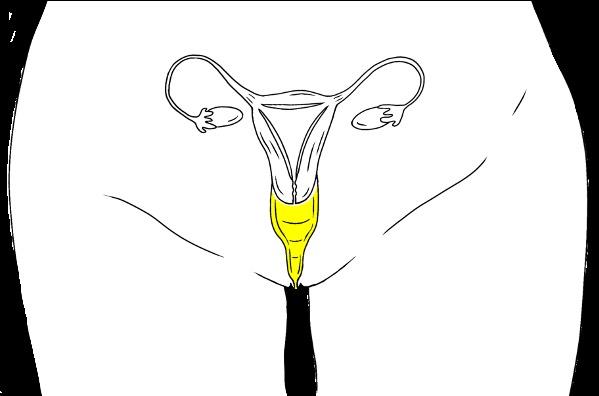
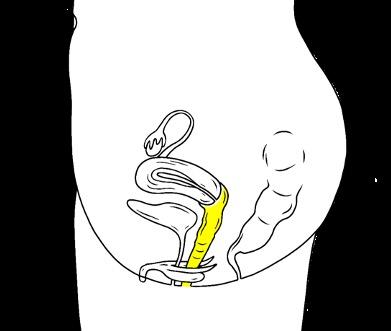


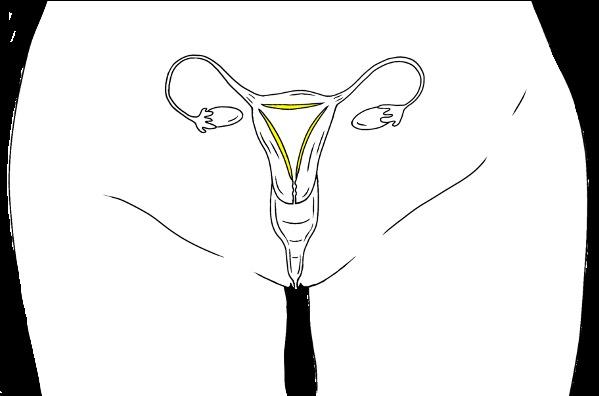
(it
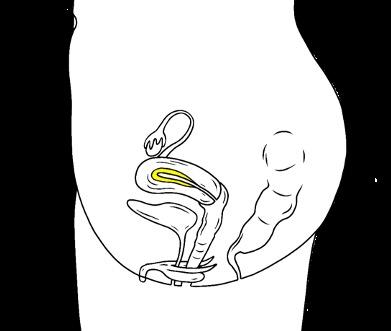


Muscle at the bottom of the
(“gateway” between uterus and vagina)
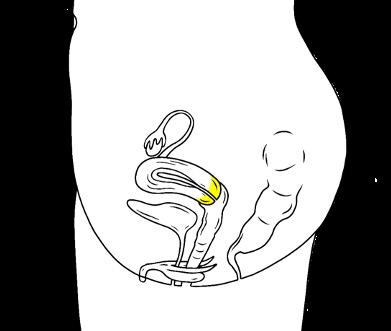





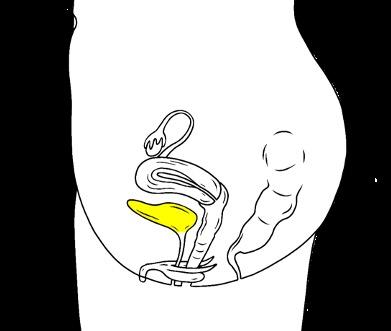


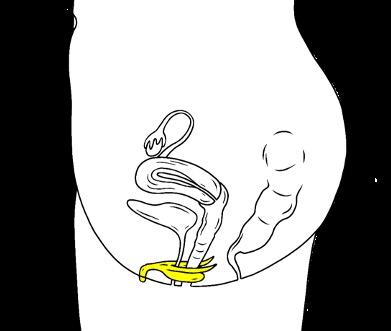


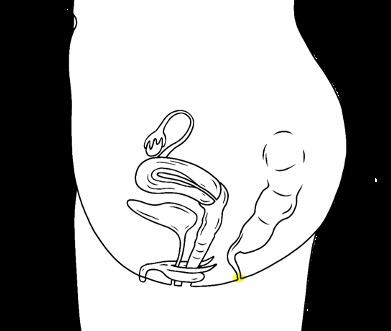


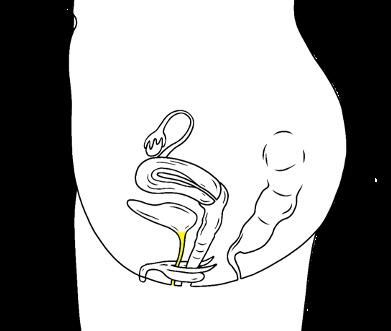




























Folds
























There may be social pressures for bodies to look a certain way or for people to use their bodies in certain ways…
These pressures can be misleading and unrealistic


parts













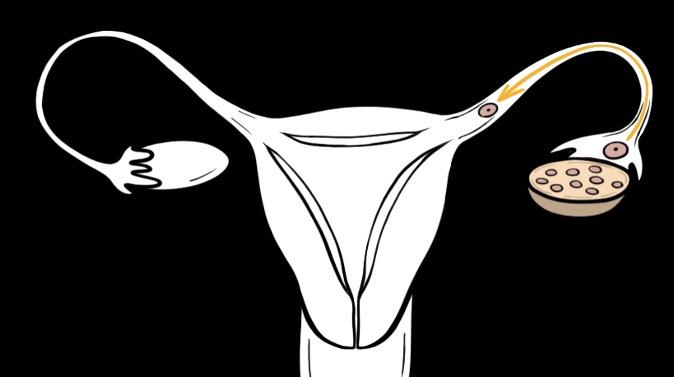






Reproductive Assistance
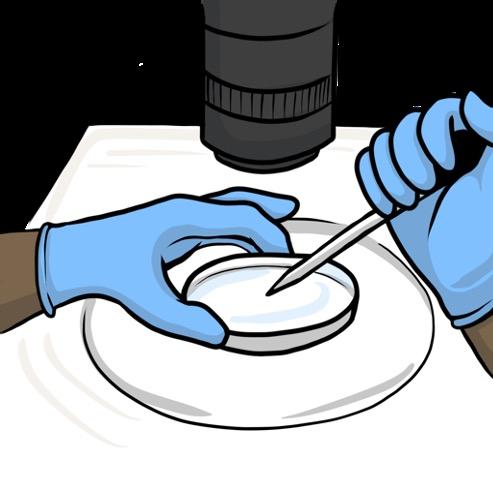


Fertilization

an egg cell joins together with a sperm cell
This process usually happens in one of the Fallopian tubes

Reproductive Assistance
gestational surrogate
(in vitro fertilization) combining sperm and egg cells in a petri dish
(intrauterine insemination) inserting live sperm cells directly into a uterus
someone who carries a pregnancy for another person or family
sperm or egg donor someone who donates their sex cells for other people use

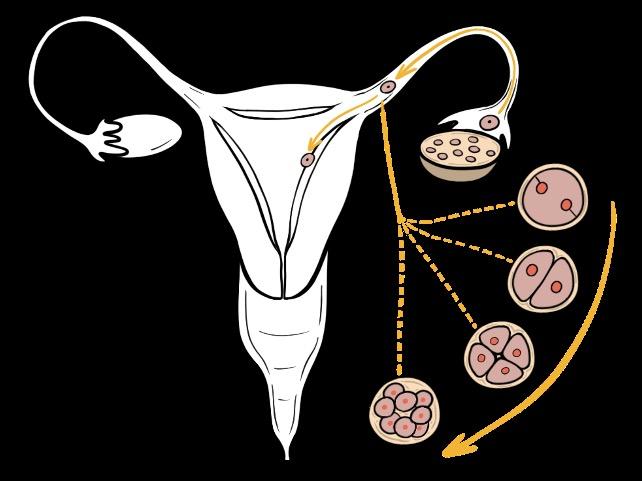
















• Prenatal vitamins (w/ folic acid)
• Regular light exercise (stretching, walks)
• Healthy, balanced diet and staying hydrated (cravings are common –talk with a medical provider!)
• Drinking alcohol, doing drugs, and inhaling smoke (including vape)
• Certain foods (like raw fish, unpasteurized cheeses, caffeine) and medications (like some antibiotics and acne treatments)
• Intense physical activities (like rollercoasters, contact sports, heavy lifting)


A full-term pregnancy is about 37-40 weeks (divided into three trimesters)
Let’s learn a bit about what happens during each trimester…

MONTH 1
After conception, cells continue to divide and multiply rapidly



• Placenta and umbilical cord begin to form
• Heart, brain, and spinal cord begin to form
MONTH 2
• Facial features (eyes, nose, mouth, ears) and limbs (arms, hands, legs, feet) begin developing
• Sex differentiation begins
MONTH 3
Heartbeat can be heard with a fetal Doppler (ultrasound device)
• Fingers and toes grow longer, nails appear, and fetus can form a fist


ONTH 4


• Skin, hair, and eyes develop color
• Eyelids can open and close Testicles may descend into the scrotum
ONTH 8
• Tremendous brain growth
• Fetus may turn upside-down in preparation for birth
• Most organs are fully developed MONTH 7

ONTH 9+ Fetus gains about ½ a pound per week as body fat increases
• Lungs are finally mature
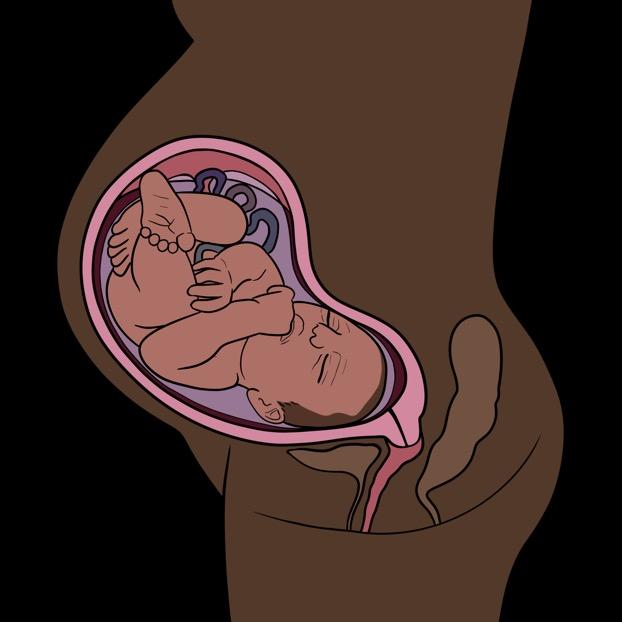



• Skin is thin and transparent Fetus is developing movement, like smiling and sucking its thumb Twins may reach for each other
MONTH 5
Fetus may react to light and sound




• Hair, eyebrows, and eyelashes begin to appear
• Ovaries stop forming new egg cells
MONTH 6
Fetus can startle and hiccup Senses of smell and taste are functional
• Possible to survive outside of the womb if born prematurely (after 24 weeks)
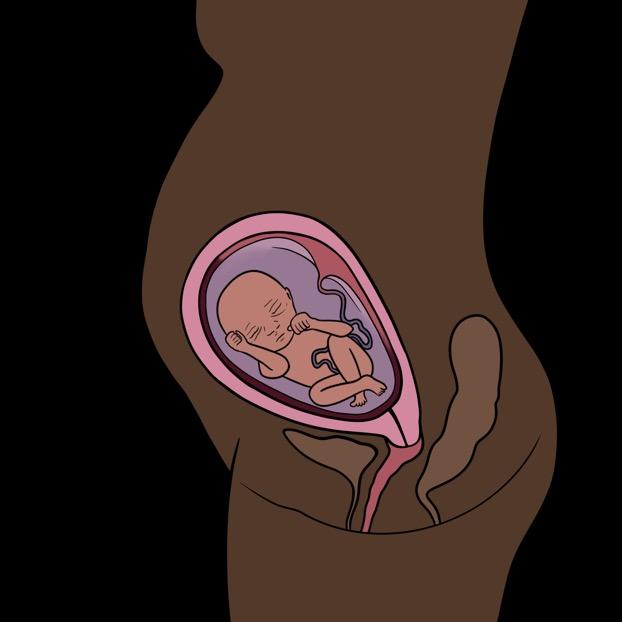

Every experience giving birth is different!

Birth Process vaginal birth or C-section (Cesarean)

1) Contractions of


1) Contractions 2) Cervix dilates 3) Push out baby and placenta


inches 1) Contractions 2) Cervix dilates 10 centimeters

Birth Process If vaginal birth is not safe or not possible…



incisions


Cut out all 12 pages…
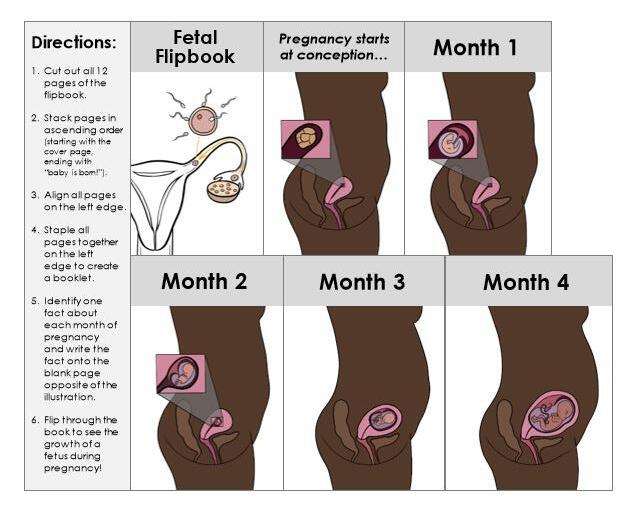


Remember,
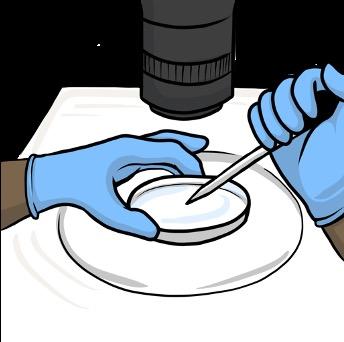
are





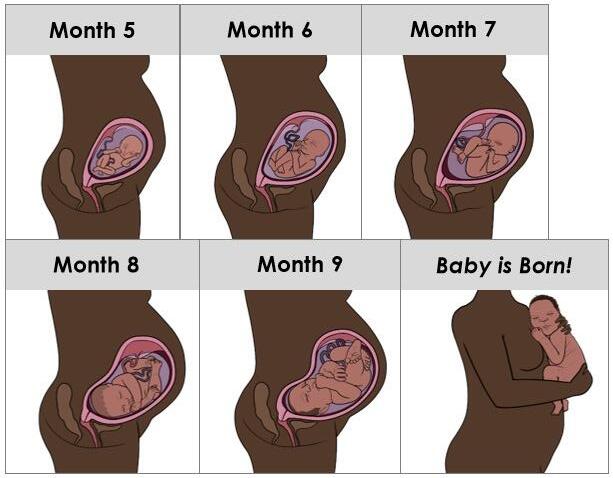


• Reflect on our own personal identities
• Discuss the importance of intersectionality
• Explore the components of gender and attraction
Ideas: See how many push-ups you can do in 1 minute Read for pleasure Cook something for your family (try


• Describe the path of a sperm cell as it leaves the body (during ejaculation)
• Describe the path of an egg cell as it leaves the body (during menstruation)
• What is “sex assigned at birth”? Let’s Review!






















































































…have a pet
…have any siblings.
…like to cook or bake.
…like to read.
…play an instrument.
…play a sport.
…like to play video games.
…like to make art.
…have been to a concert.
…have family in a different country.
…celebrate a holiday that most of your friends do not celebrate.
…can speak more than one language.
…can swim.
…know how to use public transit.
…know what career you want in the future.
…like pineapple on pizza.








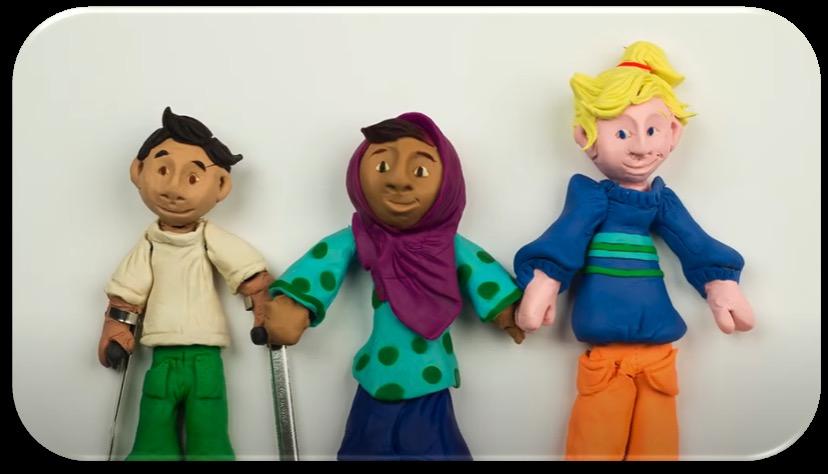



When someone notices a situation involving discrimination
A bystander chooses not to get involved or say anything.
• The more people who witness the event, the less each person feels the need to act (“bystander effect”)

An UPSTANDER chooses to speak up in support of others by:
• Calling out injustice
• Elevating the voices of those who are disempowered

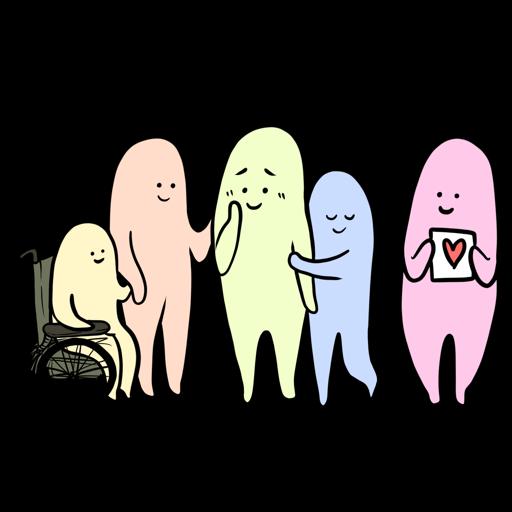









• The use of language here is purposeful, but other people may use language differently
• For example, sometimes people use “female” or “male” to refer to their gender identity
• This presentation does not include every gender and sexual identity
• Feel free to ask questions or share what you know about these or other identities!


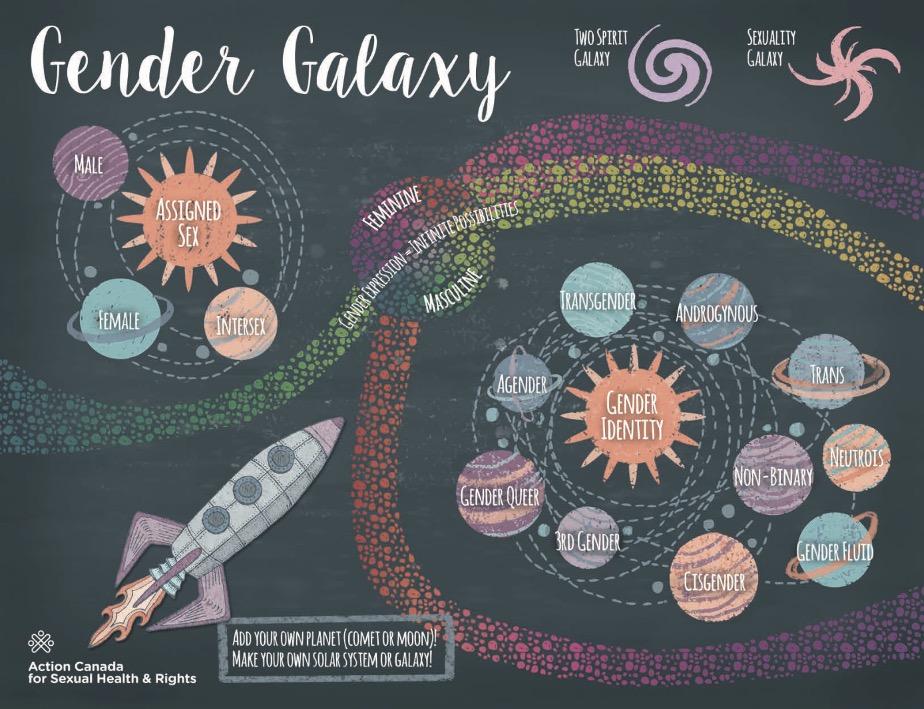

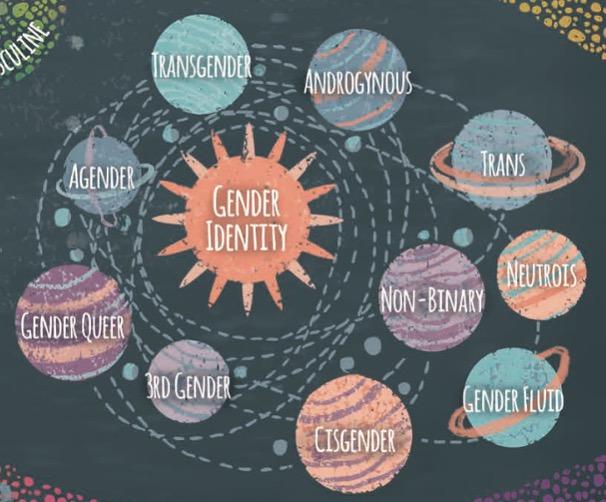




Gender Identity
Binary = a system with two options
Binary Genders: Non-binary Genders: genderfluid, genderqueer, agender, etc.
woman and man are traditionally seen as binary (mutually exclusive)

Gender Identity
These are adjectives used to describe the relationship between a person’s gender identity and what they were labeled as a baby describes people whose gender identity does not match the gender they were labeled at birth cisgender transgender describes people whose gender identity matches the gender they were labeled at birth

Gender Identity






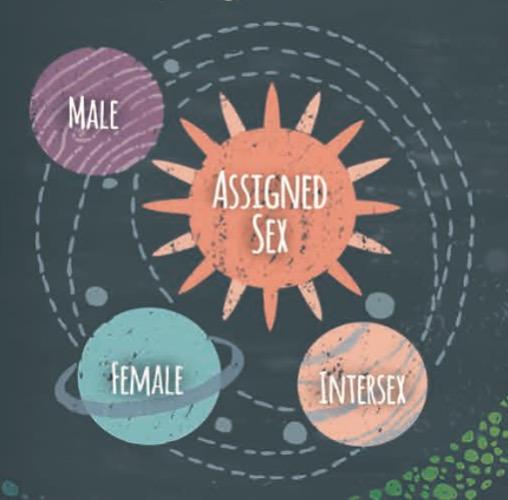




What does it mean to be intersex?
Born with unique traits that don’t fit the medical definition of “male” or “female” – this can include any combination of pelvic anatomy, hormones, and/or DNA







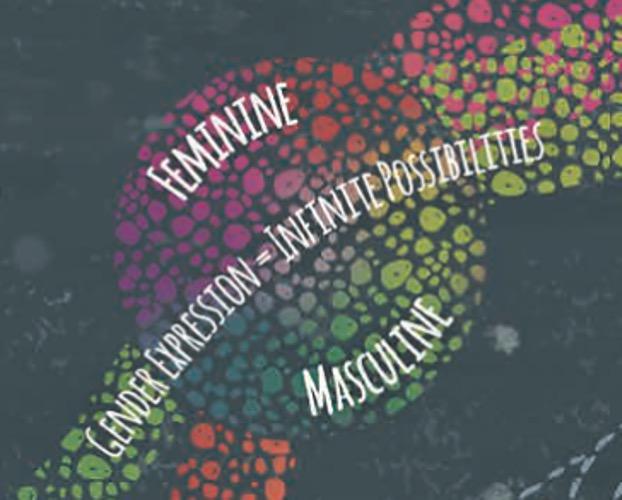


Gender Expression
Expectations about how people “should” look and act based on their gender are often rooted in stereotypes
They are also culturally specific and shift over time


Assumptions made about groups of people that do not apply to every

What might happen when someone looks, dresses, or acts in a way that is different than what society expects?


Discussion Question
In the video, Audrey states that their gender is “ dynamic .”





Discussion Question
In the video, Audrey states that their gender is “ dynamic .”
It’s possible for gender to be fluid, and a person’s experience of gender may evolve throughout their life.
There is no “wrong” way to experience your own gender!

An intense discomfort related to:
• A disconnect between body and identity
• Being unable to express oneself in a way that feels comfortable or affirming
• Being misgendered (when gender is incorrectly assumed based on body parts or appearance)
NOTE: intentionally misgendering someone is sexual harassment

Some trans and nonbinary people pursue various aspects of transition:
• Social – changing pronouns, name, and/or gender expression
• Legal – updating official documents
• Medical – hormones, “blockers,” surgery

Why might some trans and nonbinary people choose not to medically transition?









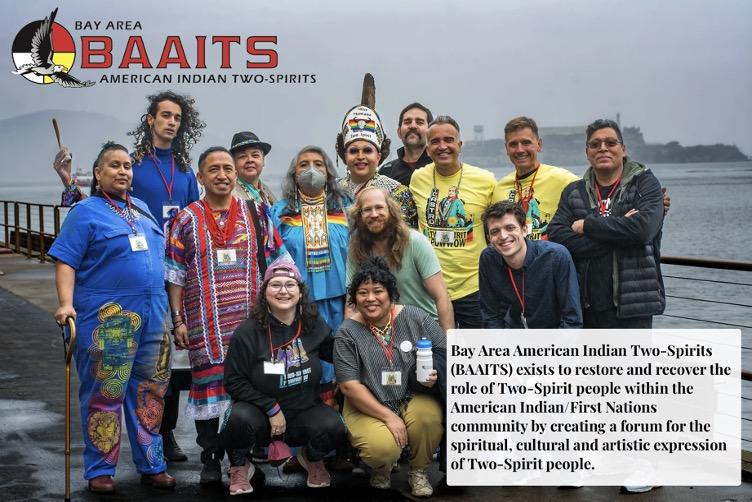

Nonbinary gender & sexual identities have existed throughout history in many different cultures:





While










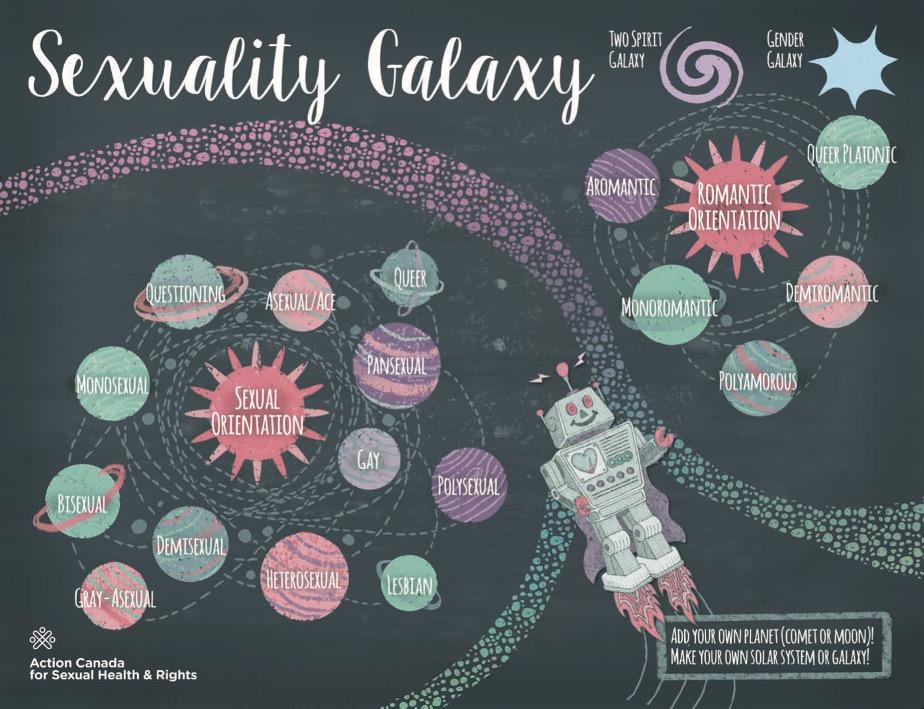

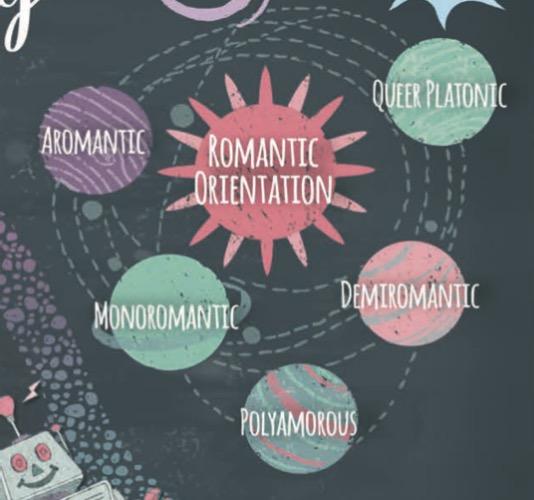








Most people go through a gradual process of figuring out who they are and how they identify.
• No rush to understand or label all parts of our gender and sexuality
• No pressure to tell people about our identities

Thoughts listen openly don’t assume use everyone’s correct pronouns notice feeling defensive don’t label others don’t judge use inclusive language

• Topic: Choose a topic from the list on the following slide. If you have another topic in mind, get it approved first!
• Design: Posters can be made on paper or a computer. Think about color, graphics, and text size – these should be visible & attention grabbing!
• Content: Make sure you understand your topic! Include a catchphrase, inspirational quote, or motivational phrase. Add tips to help people practice or be mindful of the topic.
Our goal here is respect and inclusivity!


How can we practice respect for all people in our everyday life?

Create a poster to inspire and empower other people!
They will be displayed around campus to spread positivity in our community
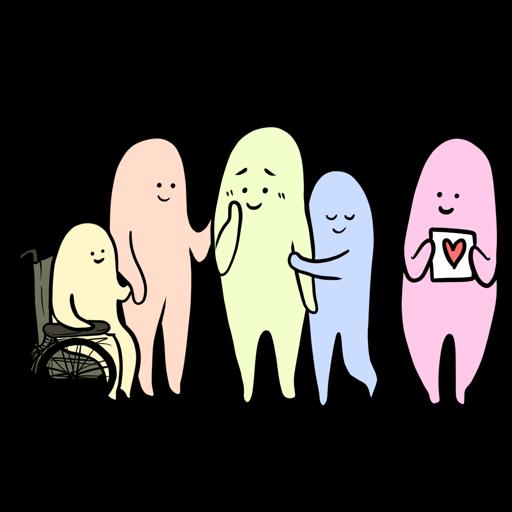

Acceptance – Keep an Open Mind
Accessibility – Empower Every Body
Advocacy – Your Voice Matters
Allyship – Stand Up, Stand Together
Community – We Are Stronger Together
Empathy – Put Yourself in Their Shoes
Growth Mindset – Stay Curious
Intersectionality – Celebrate Diversity
Kindness – It Costs Nothing to Be Kind
Pride – Be Proud to Be You

Need inspiration or have your own idea for a topic?
Come talk to me!
Respect – Treat Others How THEY Want to Be Treated
Safe Spaces – All Are Welcome Here

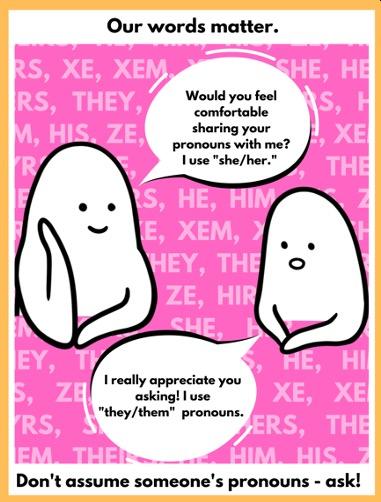
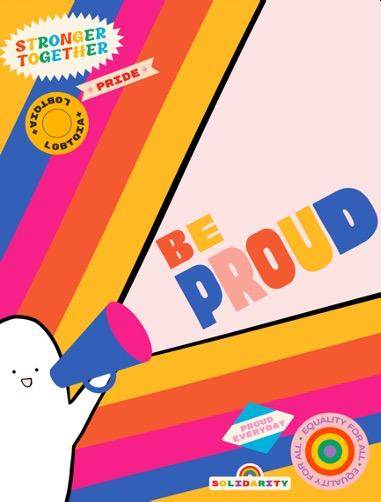


I
Why use the term SOGIE instead of LGBTQ+?
EVERYONE has a Sexual Orientation, a Gender Identity & a way that they Express themselves

1) High heels were originally designed for men.
2) Everyone uses either she/her, he/him, or they/them pronouns.
3) Some trans people do not want gender-affirming surgery and/or hormone therapy.
4) More than 1 in 5 young adults (ages 18-24) identify as LGBTQ+.
5) People who are bisexual are 50% gay and 50% straight.
6) Children of gay, lesbian, and bisexual adults are more likely to identify as gay.


7) It is obvious someone is gay or trans by the way they dress, look, or talk.
8) Some asexual people want a romantic and/or sexual relationship.
9) A person may have sexual thoughts or fantasies about someone of the same gender even if they are heterosexual.
10) People choose the gender(s) they are attracted to.
11) Coming out is an ongoing experience of communicating one’s gender and/or sexual identity.
12) Being an ally means supporting another group’s ongoing effort for equal rights and fair treatment.


• Why is it important to think about intersectionality?
• What is the difference between gender identity and gender expression?
• How can we make our school a safer place for all?

• Explore affirmative consent, boundaries, and sexual decision-making
• Discuss sexual behaviors, including whether they can lead to pregnancy and/or infection
Self-Care Ideas:
FaceTime a friend
Choreograph a dance to your favorite song
Organize something
Take a bubble bath




















Boundaries

What are two things you’ve recently asked permission for?
• Borrowing something (like a pencil)
• Giving someone a hug
• Sharing food
• Going over to a friend’s house
• Sharing private information
• Posting a photo of a friend online


Boundaries
What are two things you’ve recently asked permission for?
• If you’ve asked someone’s permission, then you’ve had a consent conversation!
• We practice consent every day – it’s simply asking for permission and respecting the answer


















This means sexual contact cannot even begin until everyone involved understands what is going to happen and voluntarily agrees.

Brain-Body Connection
The freeze response is especially common when someone:

• Experiences sexual contact that they don’t want
• Feels that they can’t or shouldn’t say “no” in a situation

Brain-Body Connection
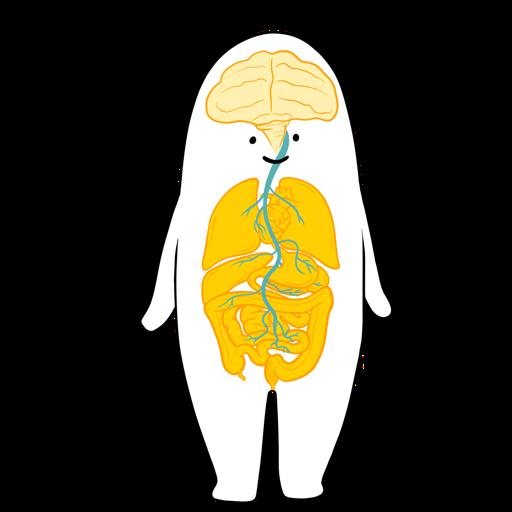
All mammals have automatic survival responses that help us stay safe: fight–flight–freeze


Affirmative consent protects our sexual agency and helps ensures that our body’s automatic responses are not misunderstood by others.





















Checking


Checking


Checking




Precise: A person should be clear about what they are asking someone to consent to.
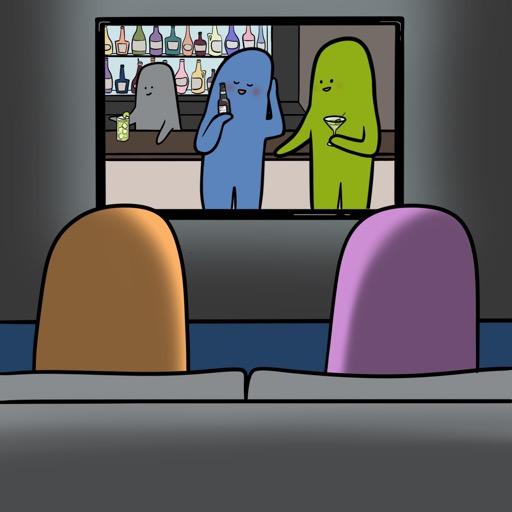













Respectful negotiation can also be helpful in
conversations… …but sometimes asking follow-up questions or making suggestions can help find a compromise that feels good for everyone

I-Spy Consent Scenarios
1. Read through the scenario.
2. Think about the different components of consent.
3. Decide if there was consent.

Darius is in college and just completed a class on coding. At the end of the semester, the professor asked him out. Darius said “yes” because he was worried that he would get a bad grade if he turned them down.
Was that consensual? Why or why not? asked him out. Darius said “ because if he turned them down.


Maya and Jaime always eat lunch together. Maya usually shares her fries with Jaime. Jaime reaches over to take some fries from Maya’s plate.
Was that consensual? Why or why not? usually shares her

Katie texted her best friend Arjun to see if it was okay to post the photo of them from the night before. Arjun replied to the text with a ‘thumbs up’ emoji.
Was that consensual? Why or why not? to see

Bowen and Tai are best friends. Out of nowhere , last night as they were watching a movie, Tai kissed Bowen.
Was that consensual? Why or why not? Out of nowhere, night

Sawyer and Jett have been dating for three weeks. Last night at a school dance, Sawyer asked Jett to slow dance. Jett smiled and said, “ I would like that .”
Was that consensual? Why or why not? asked Jett to slow dance. Jett smiled

Over the weekend, Aziz and Raquel hooked up at a party. Aziz was sober, but Raquel had been drinking .*
had been drinking.*
Was that consensual? Why or why not?

Remember… Consent conversations get easier the more we practice…
It’s OK to feel awkward or nervous! The ACCEPT model is all about communicating effectively and respecting boundaries









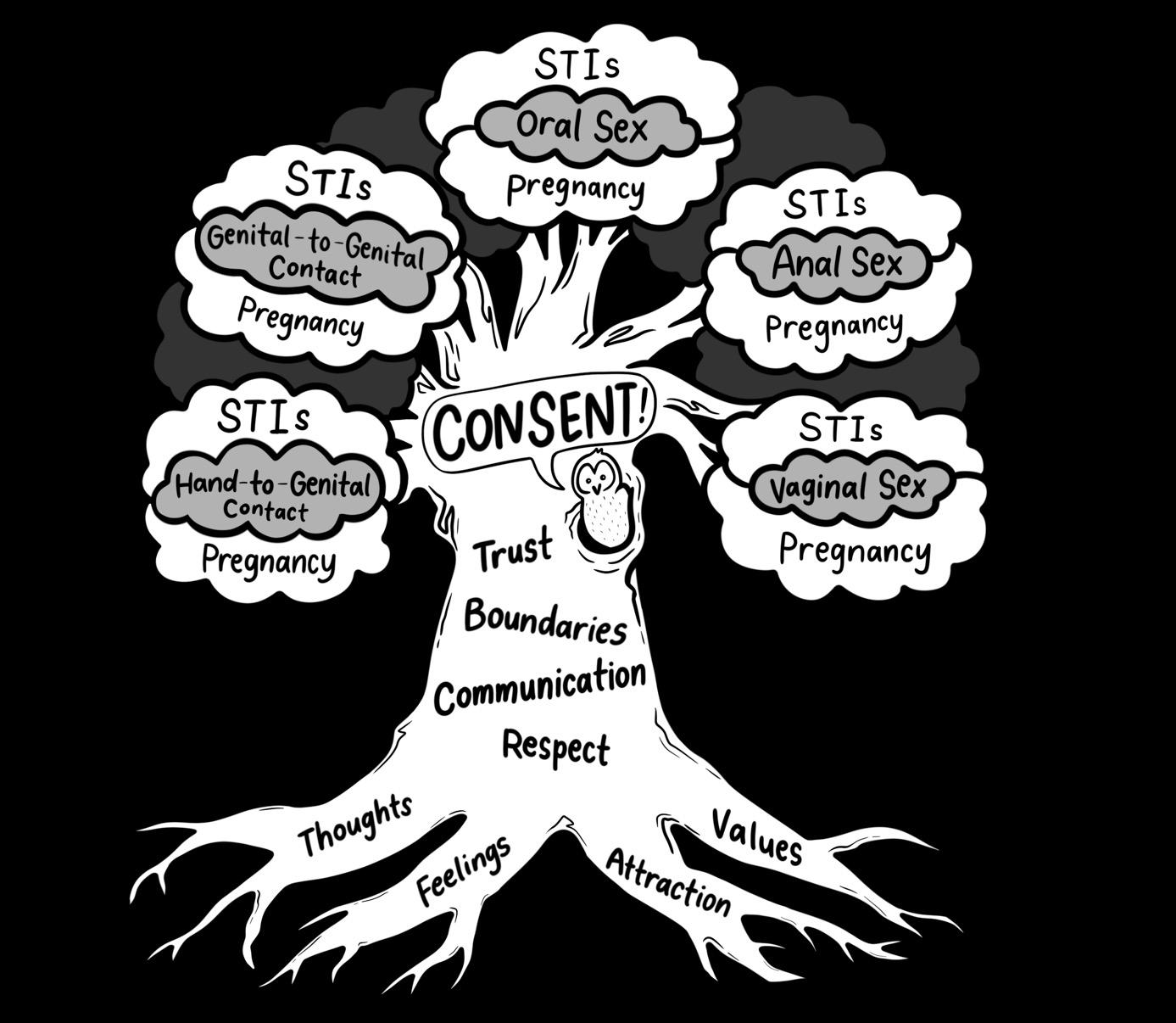




What personal values might influence decisions about sex? Sexual Decision-Making
• Commitment
• Loyalty
• Faith
• Purity


Romance
• Curiosity • Experience • Pleasure • Fun • Connection

Sexual Decision-Making
What external factors might influence decisions about sex?
• Desire to “fit in,” be popular, or be liked
• Peer or partner pressure
• Unrealistic expectations from the media

What external factors might influence decisions about sex?

• Desire to “fit in,” be popular, or be liked
• Peer or partner pressure
• Unrealistic expectations from the media these can affect our sense of agency


personal motivations that guide decision-making





• Comfort with and
• How sex
• Values and preferences if





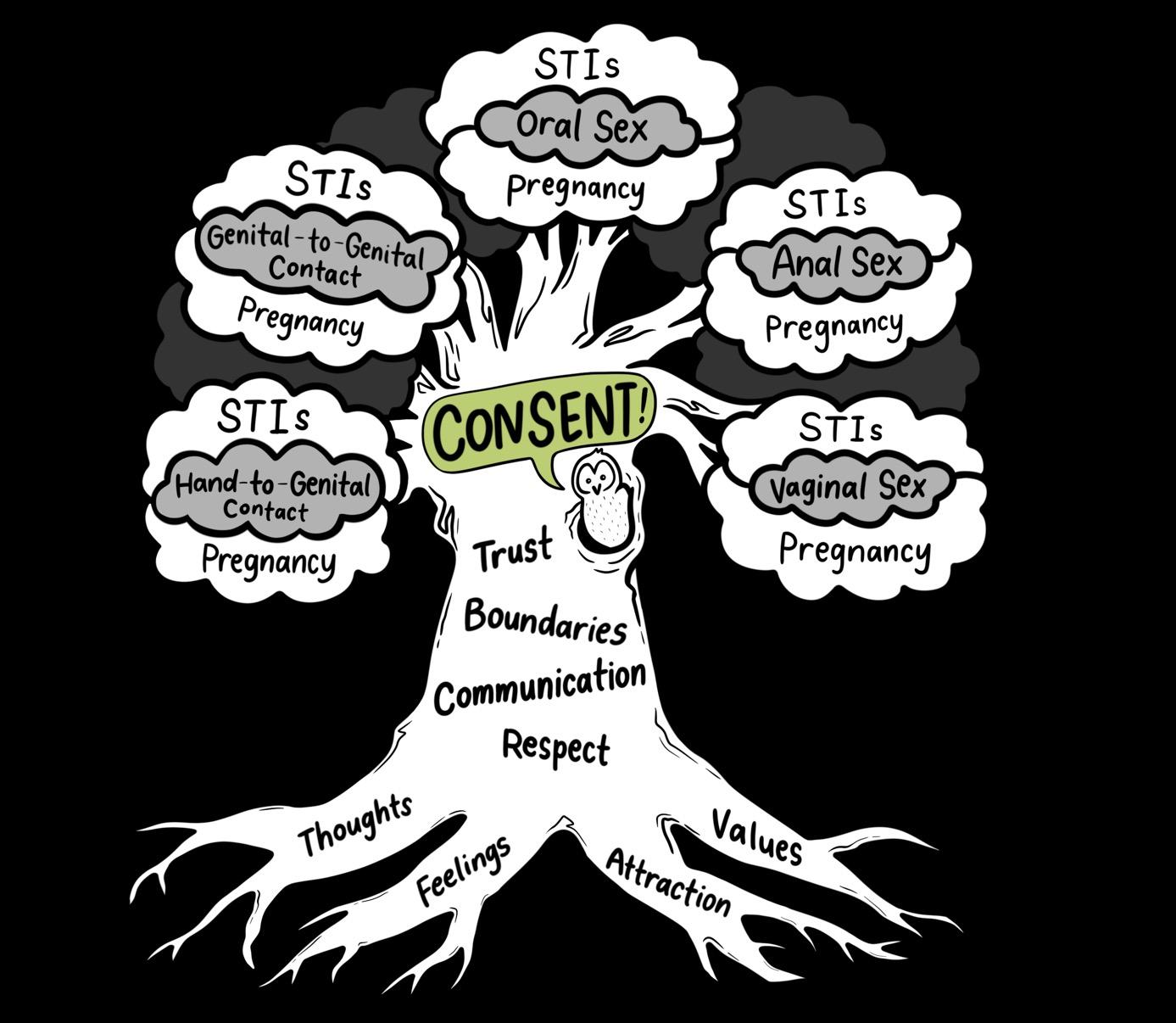












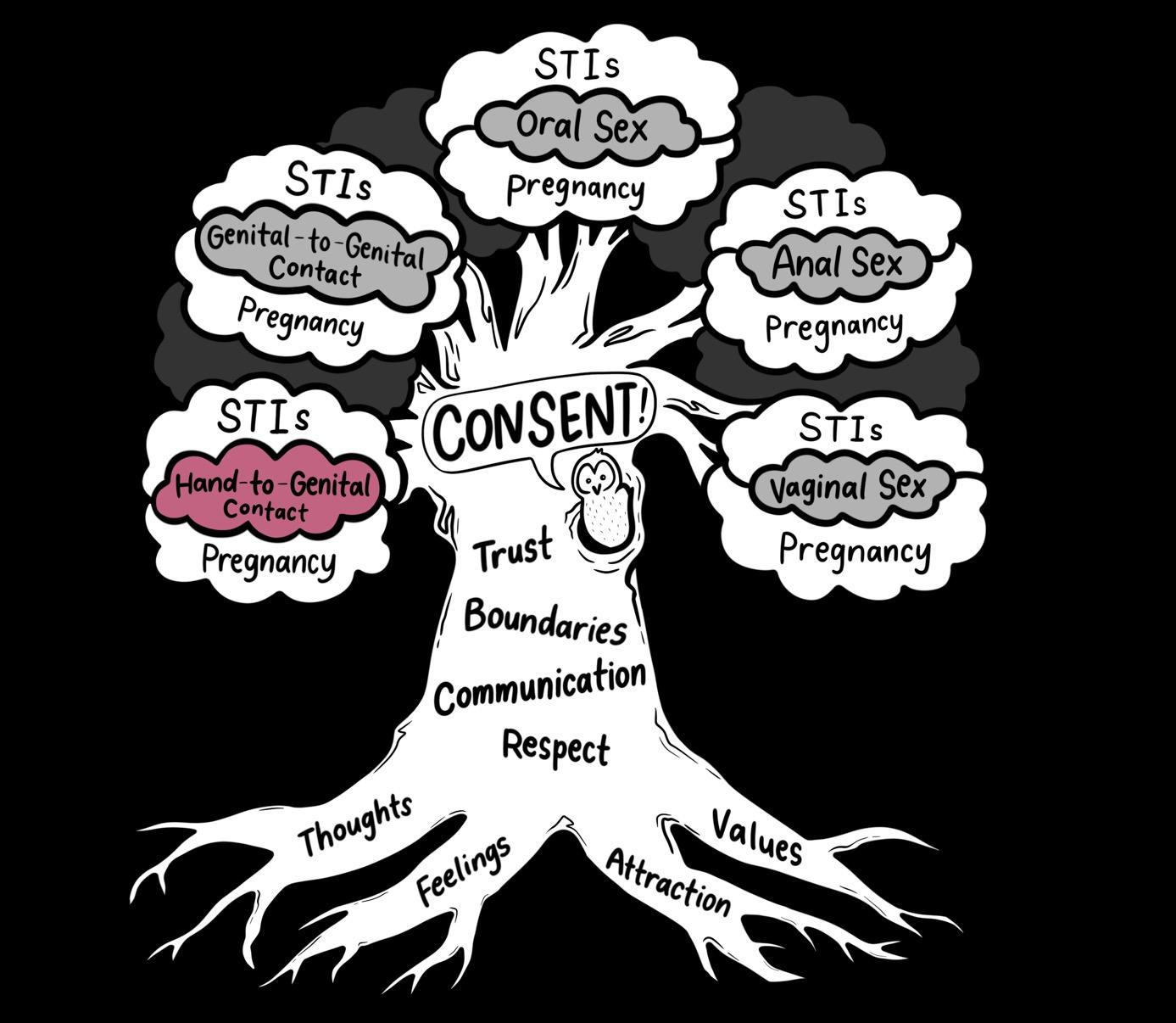

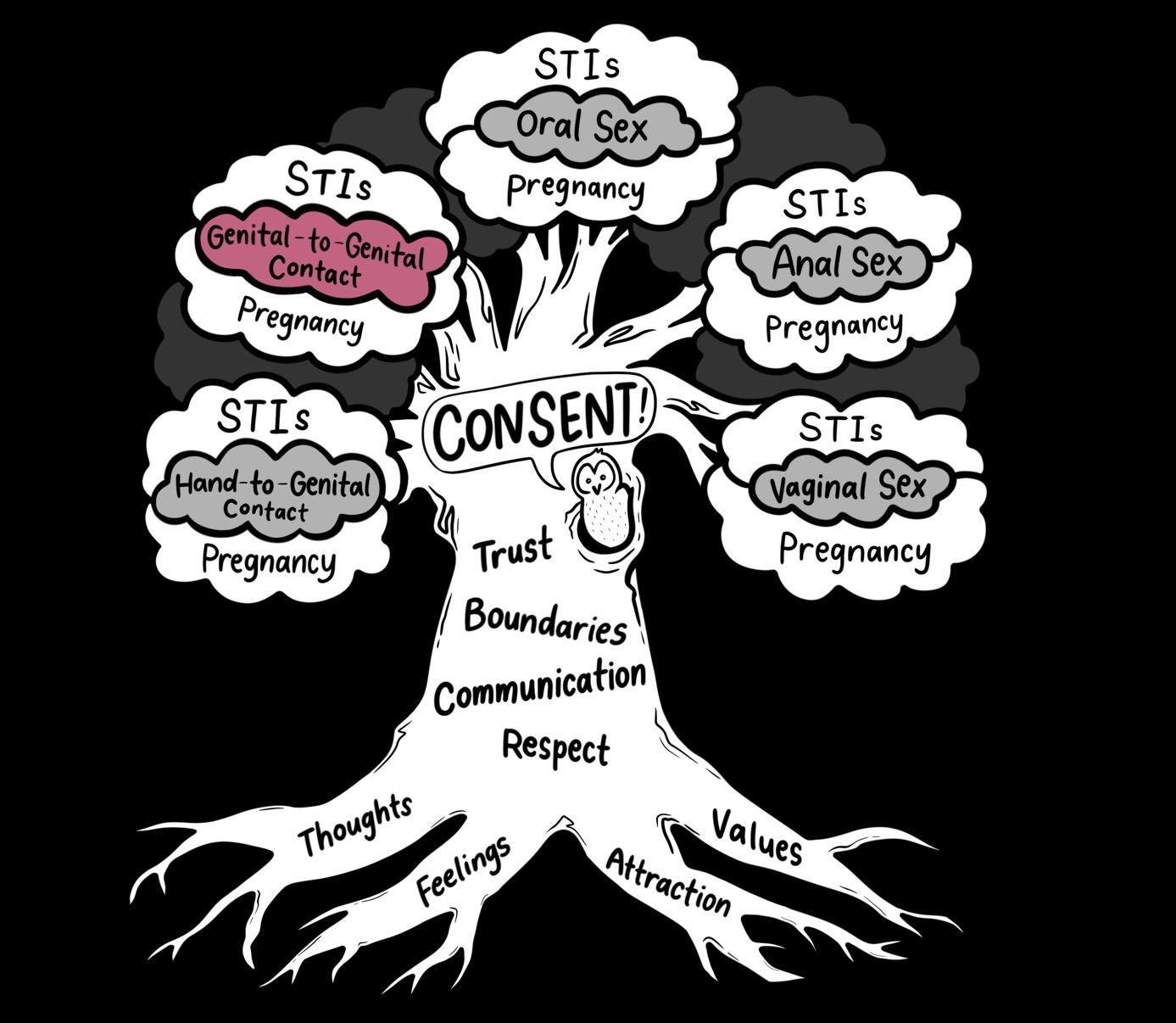

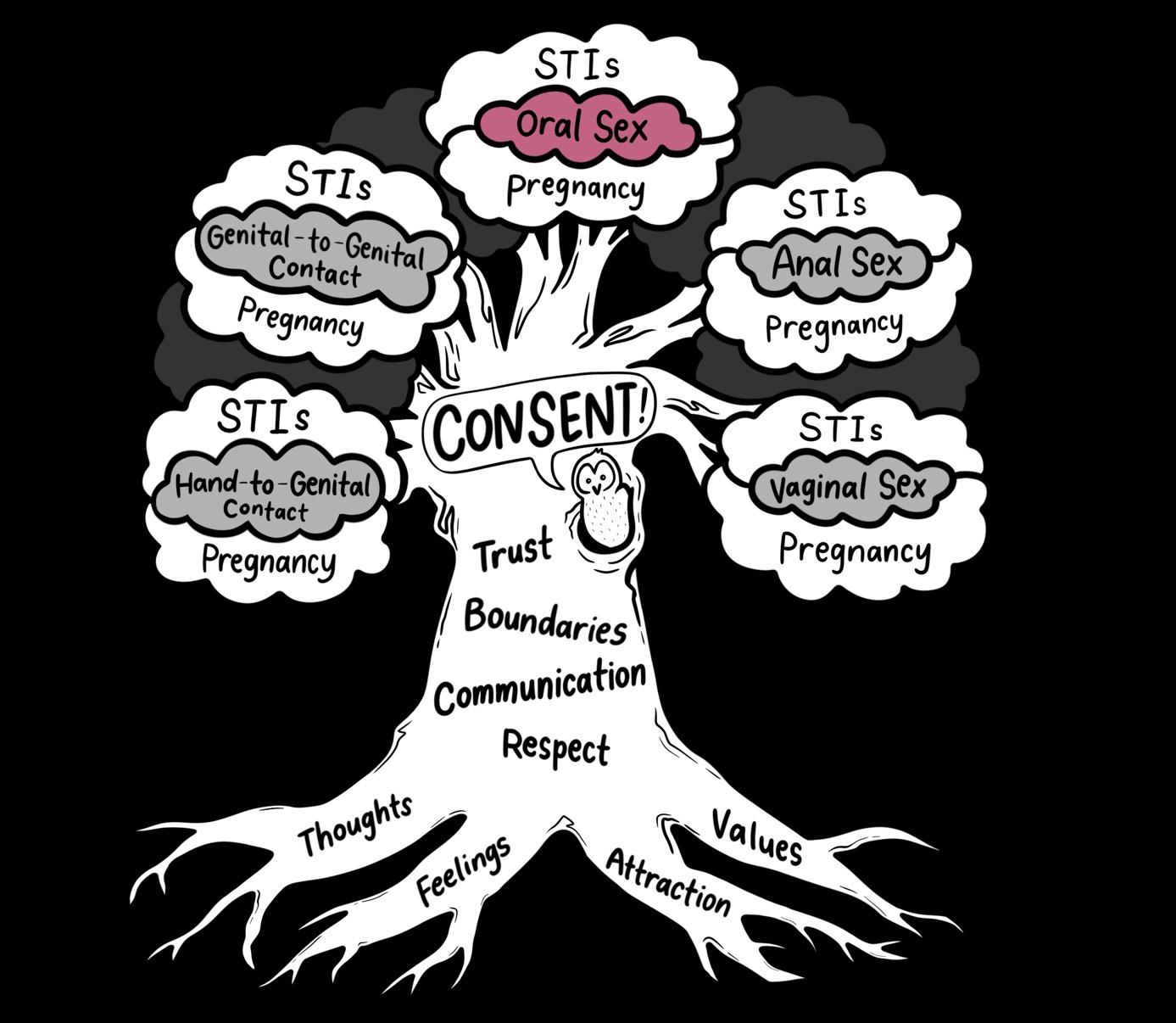
is when a person touches their partner’s penis, vulva, or anus with their mouth

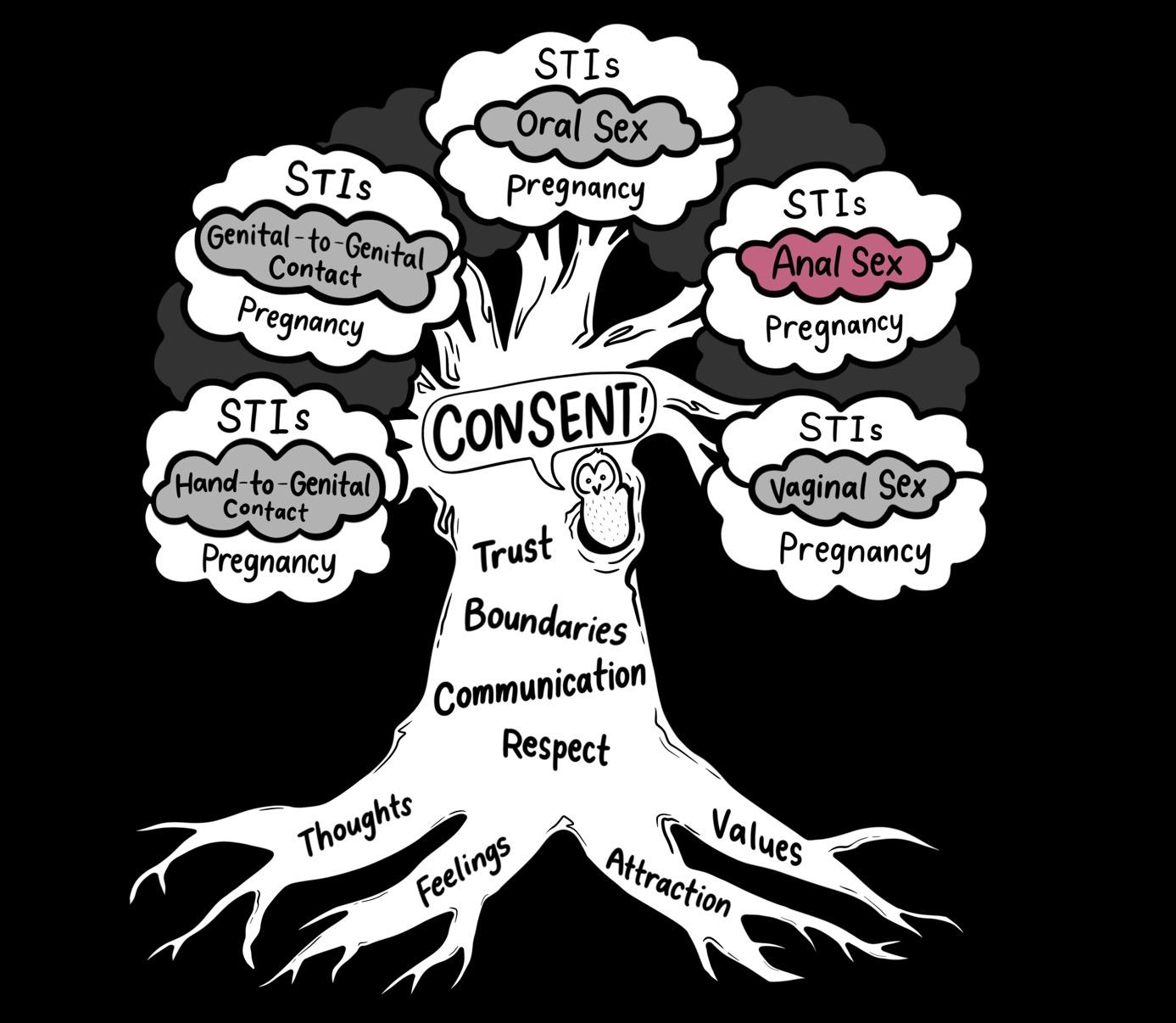
is when a person inserts their penis into their partner’s anus

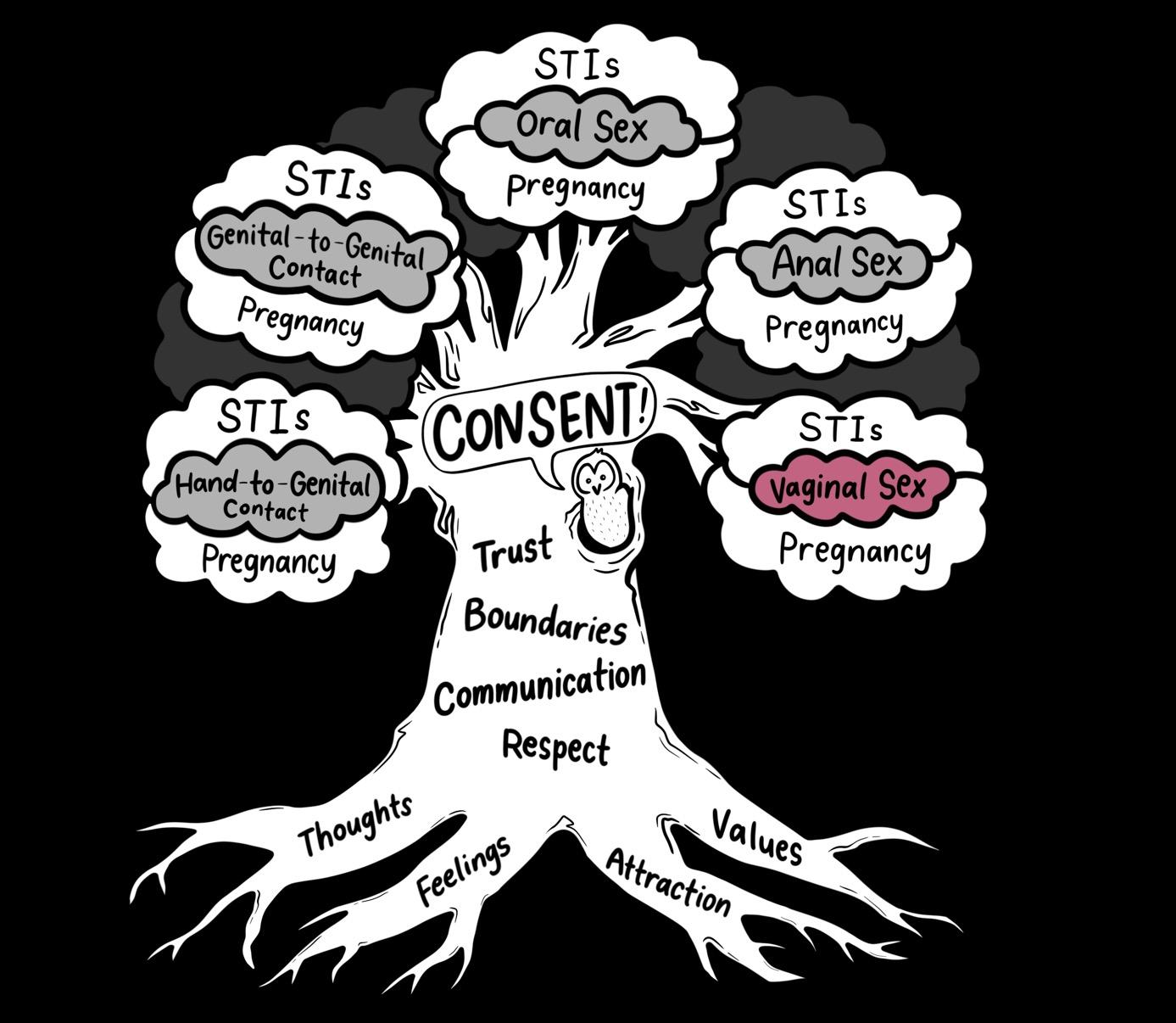
vaginal sex
is when a person inserts their penis into their partner’s vagina







If a person has an STI, which sexual behaviors can transmit STIs ?





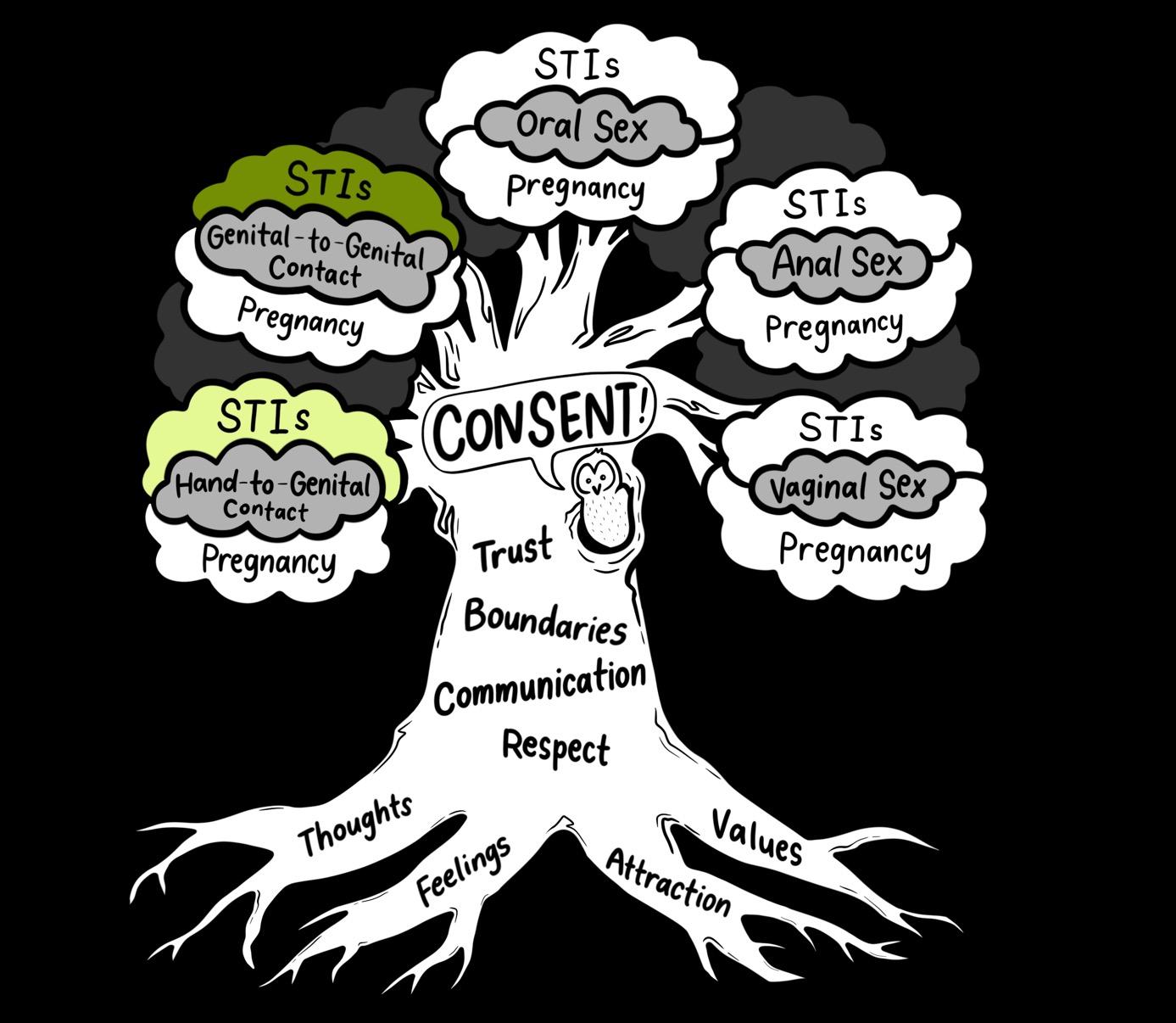

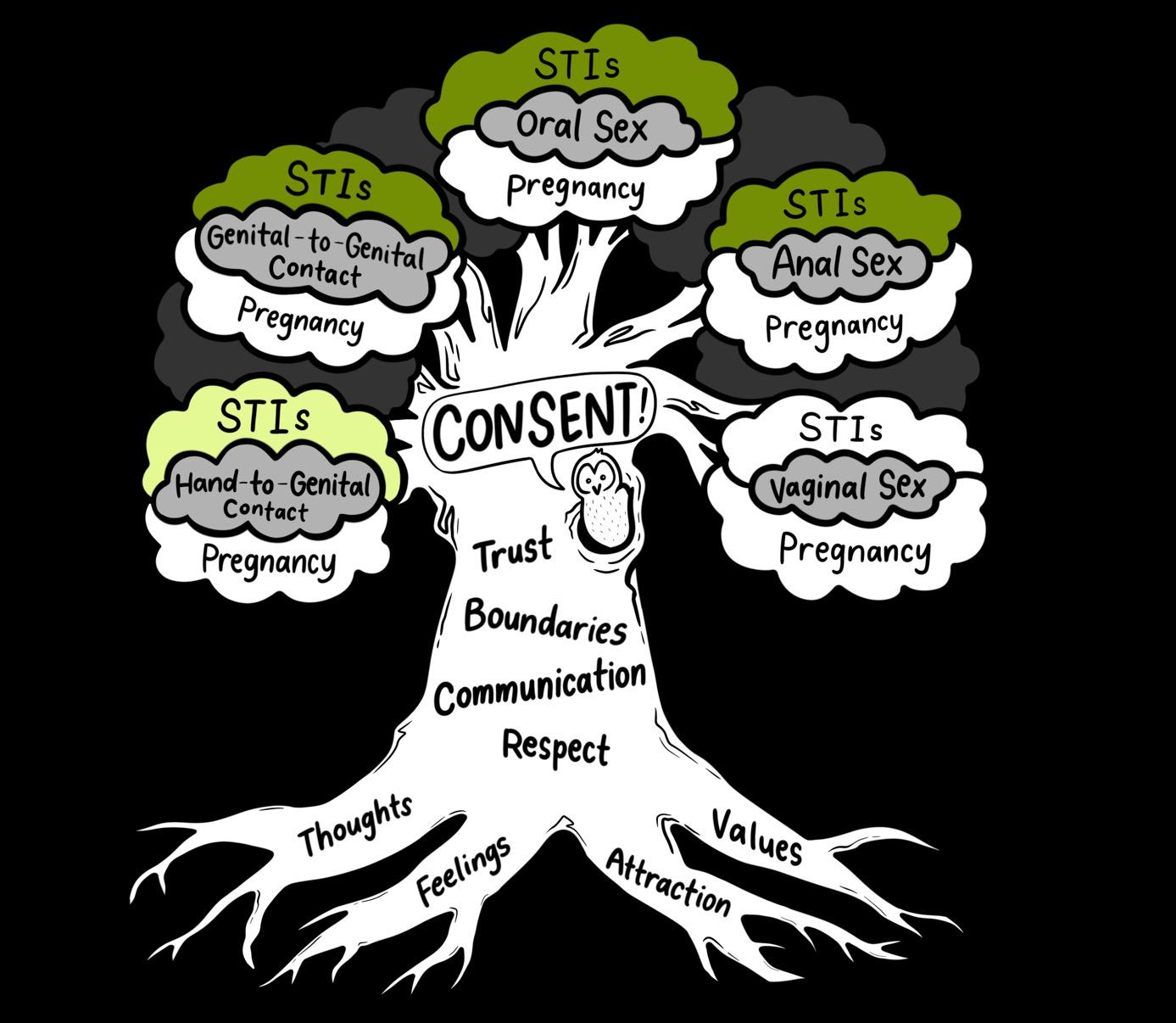

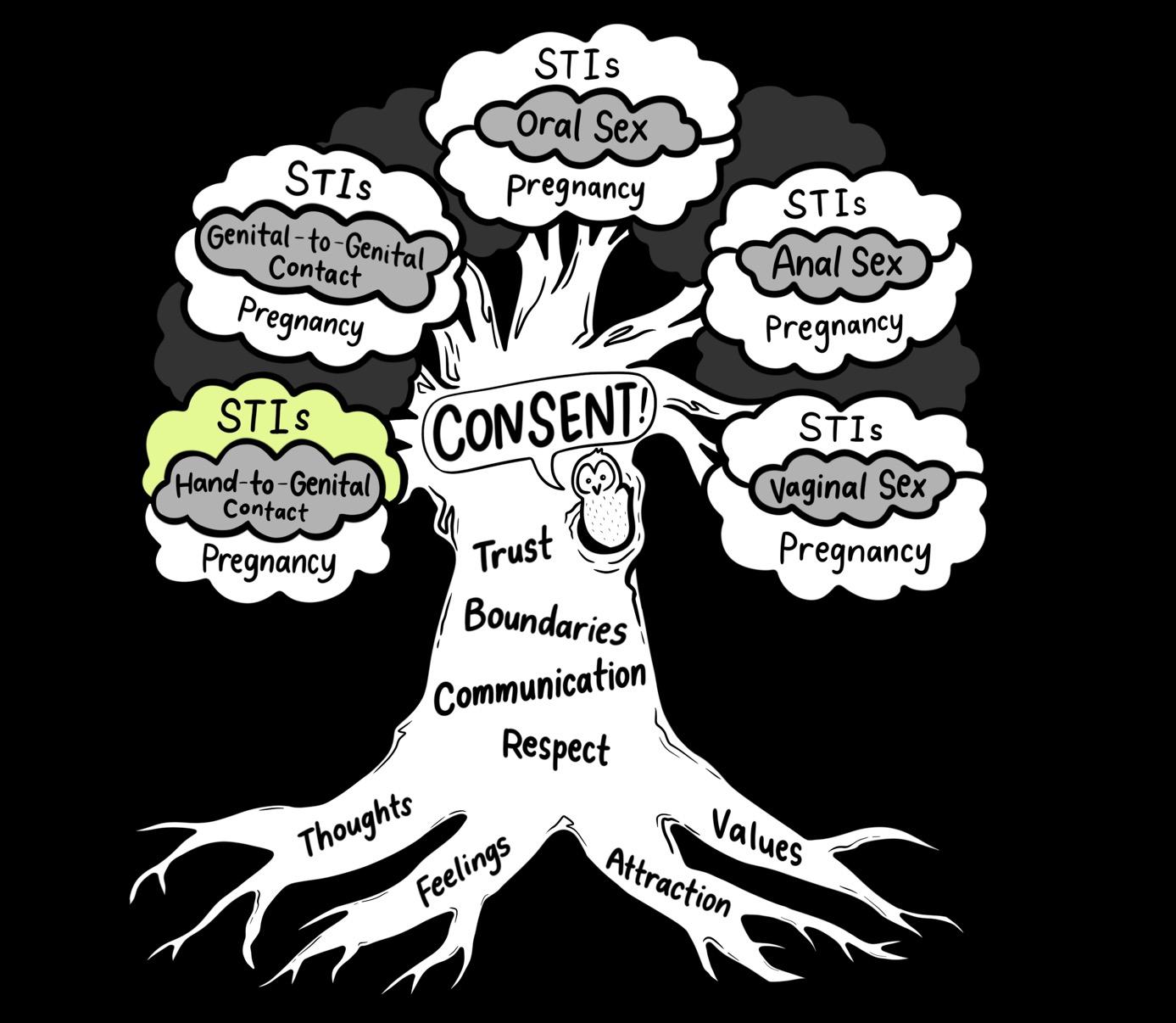
If a person has an STI, which sexual behaviors can transmit STIs ?

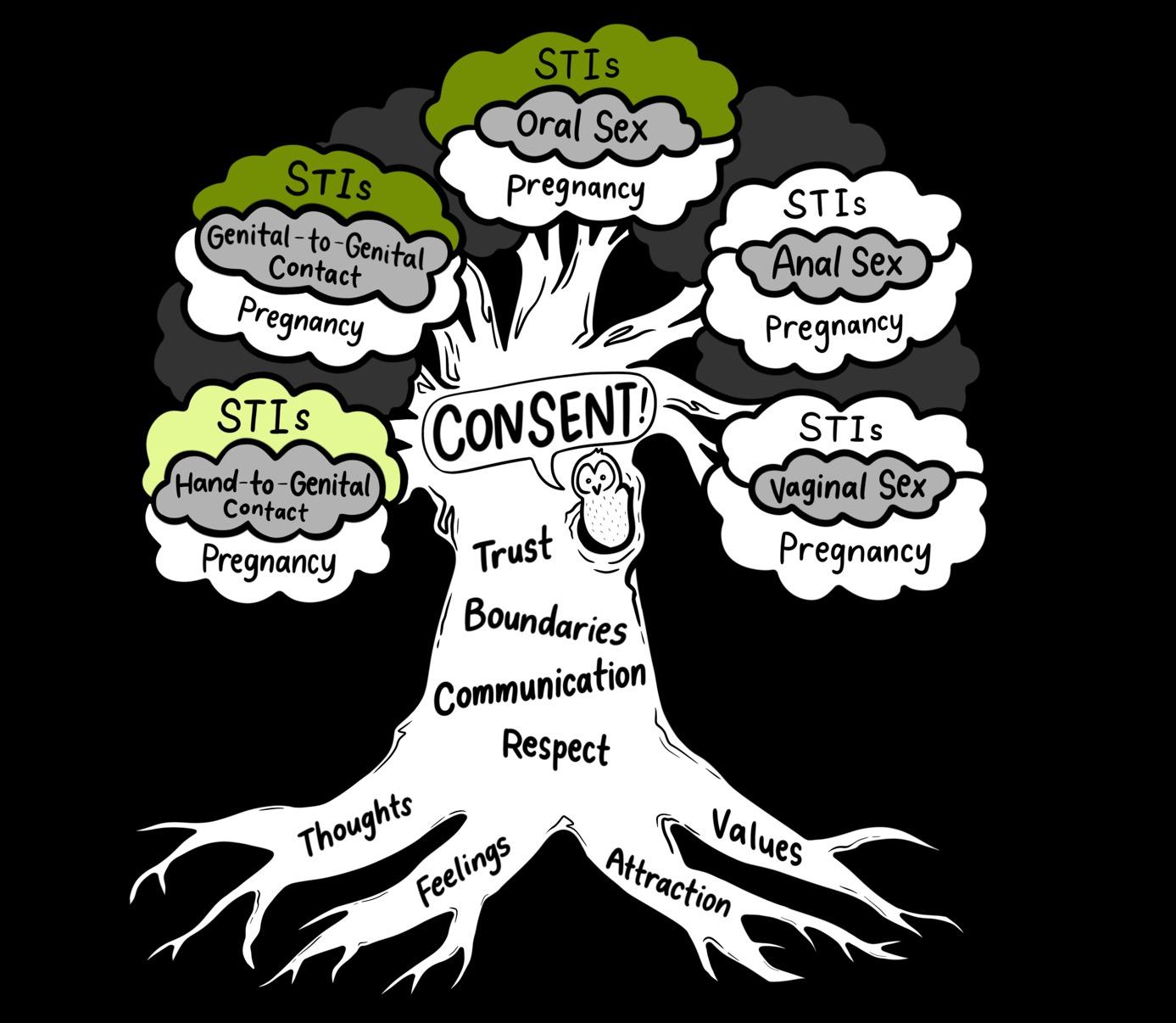

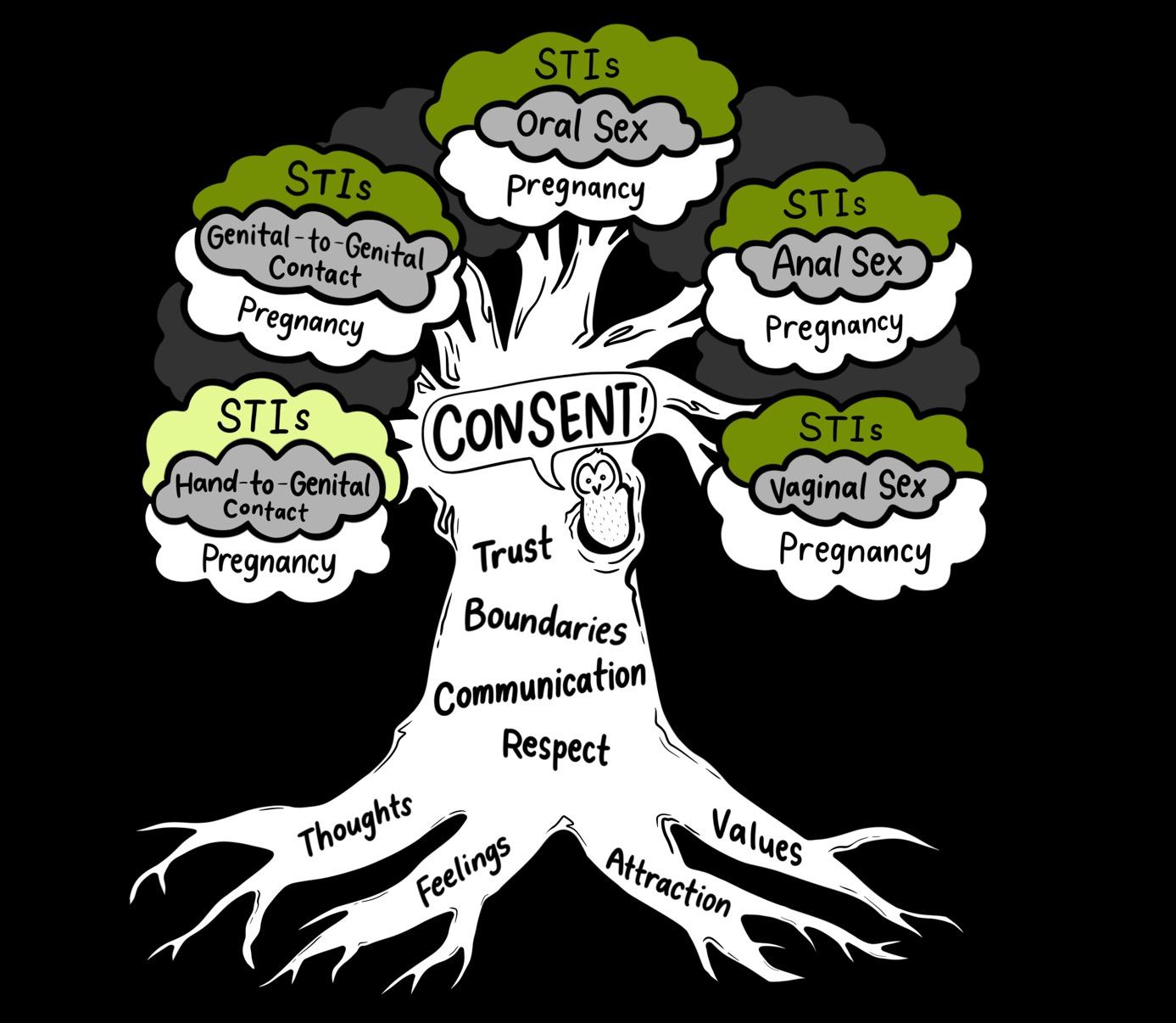







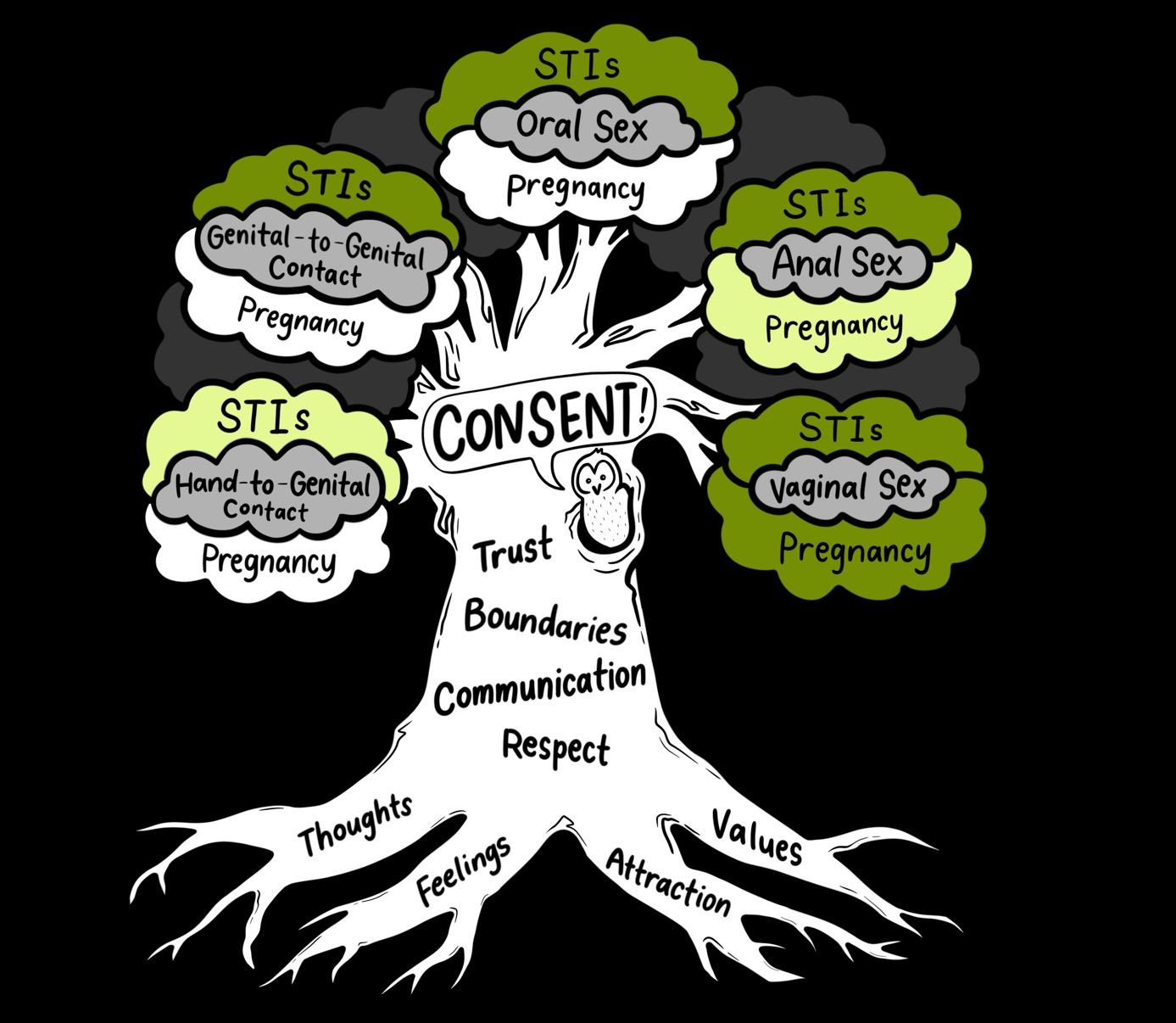







If partners have these “ingredients,”
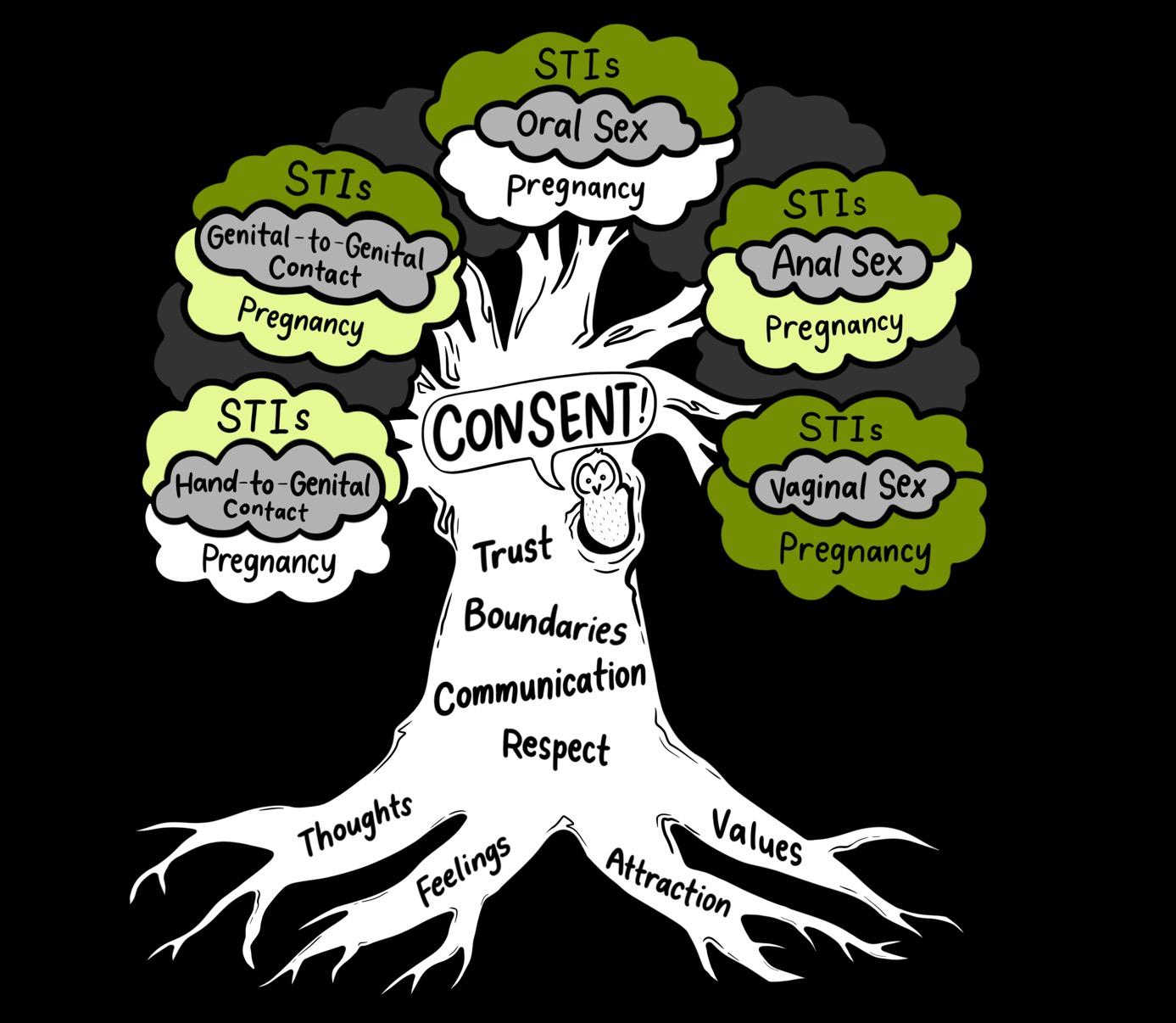

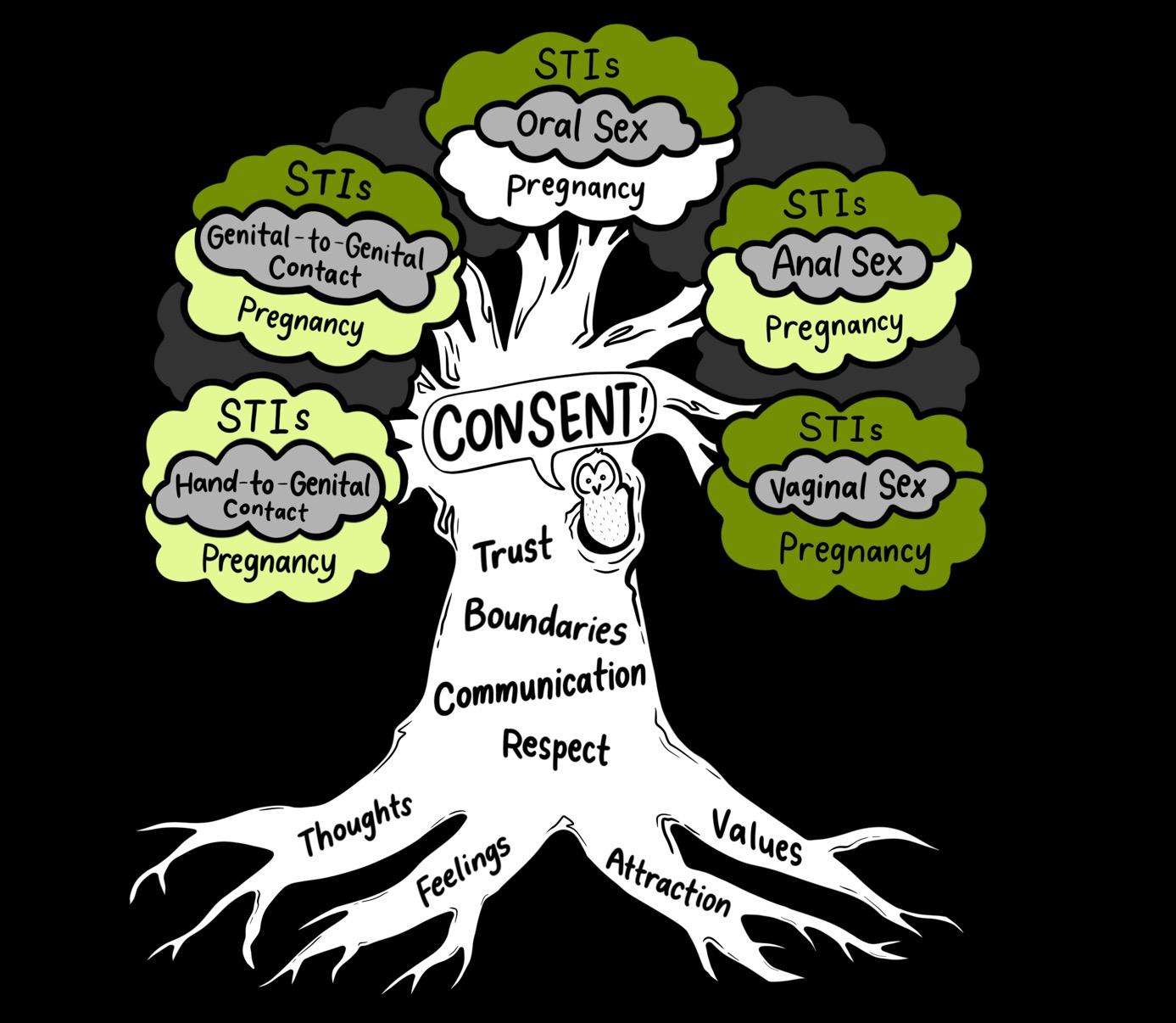


If partners have these “ingredients,” which sexual behaviors can lead to pregnancy ?









Less than 1 in 20 middle schoolers (4.9%)* report that they have had sex





















Whether or not a person considers themself to have had sex (or to be a “virgin”) depends on their definition of “ sex”
There is NO universal definition – it’s usually based on personal values, identities, and boundaries.














• What is sexual agency and why is it important?
• What does the ACCEPT model stand for?
• What is the most effective way to prevent pregnancy and/or STIS?

• Explore different methods of birth control and how they work
• Pop Quiz! game to review key information about birth control











































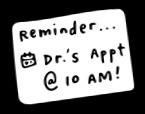



Hormonal Methods

use vs. Perfect use (correct & consistent)
Some have more room for mistakes!

Hormonal Methods


Some people struggle with heavy bleeding, painful cramps, irregular cycles, or gender dysphoria related to their period…
The pill, patch, and ring give users more CONTROL over their cycle!




Methods



Methods





Hormonal Methods





















…some IUDs can also be effective as emergency contraception if inserted within 5 days after sex


ü Most brands are available to buy over-the-counter or FREE at local health clinics
• NO age or gender restrictions
• “ ella ” is the only type that requires a prescription



ü Take ASAP (no more than 3-5 days) after unprotected sex
ü Effectiveness is based on timing and weight of the user
ü Not designed for ongoing use

ü Over 99%
ü This long-term birth control is effective for 10+ years
ü Copper ions deactivate sperm cells
ü Must be inserted/removed by a medical provider


Non-Hormonal Methods
Contraceptive gels:
spermicide
Phexxi (Rx) Spermicide can be combined with any other method!

Cervical barriers:


Insert into the vagina before sex
diaphragm (Rx)
cervical cap (Rx)
sponge

NO hormones
Does NOT prevent STIs

ü Requires removing the penis from the vagina or anus before ejaculating
About 78% effective on average…



ü Use one at a time
Available for FREE at local health clinics
NO age restriction
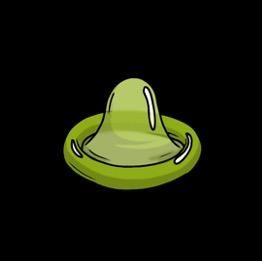
Prevents STIs!




→ Some sperm may be released with
fluid → Timing can be a challenge
Does NOT prevent




If choosing to have sex and pregnancy is possible, COMBINE



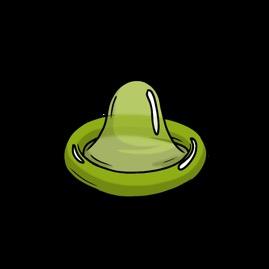




(1) condom and (1) other method for extra protection! (prevents pregnancy & STIs)

Things that can help someone feel more comfortable going to a clinic:
ü Knowing your rights
ü Choosing your provider
→ Local and youth-friendly
→ Accepts Family PACT




→ Provides inclusive medical care
ü Preparing for your visit




→ Connect with your support system
→ Write down any questions and concerns beforehand









This game is meant to review all the birth control methods we have learned about…
ü Find a partner and sit next to them: the person sitting on the left represents “YES” and the person sitting on the right represents “NO
ü As we go through each question and method, whoever is representing the correct answer should “pop up




















it be used to skip periods?







it be used to skip periods?







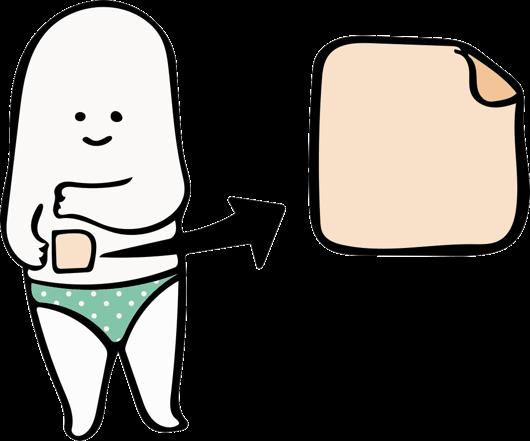





























































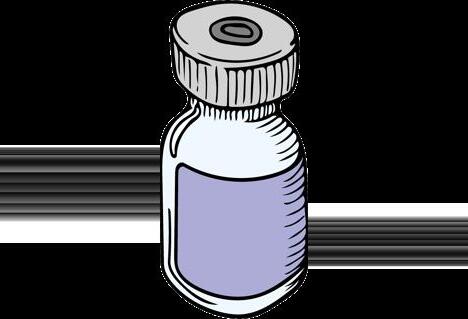













































• Which types of
•
• Why else might a person use

• Discuss the four safe & legal pregnancy options in CA ( abortion, adoption, parenting, and Safe Surrender)
• Review what we know about conception, pregnancy, prenatal care, and the law
Self-Care Ideas:
Make up a new game or sport with a friend or sibling
Have a spa night
Send someone you love a card or care package
















People have been subjected to unethical
being pressured into using



Historically, reproductive rights have been limited…
Certain groups – like people of color and people with disabilities – have been targeted with unjust practices to prevent them from reproducing.

Historically, reproductive rights have been limited…
Still today, laws that restrict reproductive decision-making have especially significant impacts on women of color and people with lower incomes.

Due to shifting values, goals, and circumstances, views on pregnancy and parenting may or may not change over time…
Some folks might choose to:
• Become a parent (via pregnancy, adoption, or fostering)
• Contribute to other families (via surrogacy or cell donation)
• Remain child-free & cultivate kinship with others (partners, pets, chosen family, etc.)


All these options are legally available to people of all ages in California.

Teens who are pregnant do not need permission to choose any of these options… but it can help to talk with trusted adults for support with decision-making.










If choosing to… End the Pregnancy
• Medication abortion
• Typically done within the first 10 weeks of pregnancy
• Procedural abortion
• Typically done within the first 12 weeks of pregnancy (but legal up to 24 weeks in CA) Pregnancy Options Flowchart



If choosing to…
Continue the Pregnancy Adoption Parenting
What are some things that pregnant people should and shouldn’t do? It is important to engage in prenatal care throughout the pregnancy

helps to make a birth plan before going into labor… Pregnancy Options Flowchart
If choosing to… Continue the Pregnancy Adoption Parenting What are some things that might be part of a birth plan ?

If choosing to…
Continue the Pregnancy Adoption Relinquishing legal rights and responsibilities as guardian
• Open adoption
• First (biological) and adoptive parent(s) can know each other’s identity, may agree to remain in contact
• Closed adoption
• No identifying information is shared between them

If choosing to… Continue the Pregnancy Adoption Parenting
It is important to engage in prenatal care throughout the pregnancy
• DOs: prenatal vitamins, balanced diet, hydration, regular light exercise, plenty of rest, etc.
• DON’Ts: alcohol, drugs, smoke, vape, certain foods & medications, intense physical activity, etc.

If choosing to… Continue the Pregnancy Adoption Parenting
• Care team: finding medical professionals to help with delivery and/or support professionals to help during and after delivery
• Support system: partner, family, friends , etc.
• Labor & delivery: getting mentally and physical prepared choosing a location, considering pain management options, etc. It helps to make a birth plan before going into labor…

If choosing to…
Continue the Pregnancy Adoption
Relinquishing legal rights and responsibilities as guardian
The vast majority of adoptions in the U.S. are open or semi-open Which type of adoption do you think is more common?


• Choices about the child’s health & well-being: feeding, safe living arrangements, medical care, etc.
• Balancing responsibilities: caring for dependents, household chores, continuing education, etc.
• Support & self-care as a new parent: personal care, childcare, financial support, emotional support, etc.



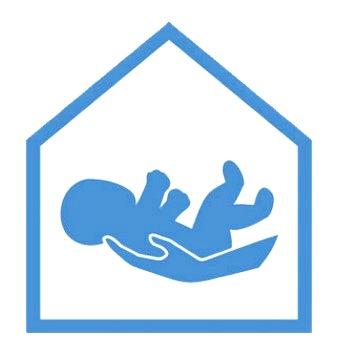





















Each person will get a puzzle piece with half of a sentence on it…
1. Find the person with the piece that completes your sentence
2. Stand with your match to form a large circle around the room






• What does reproductive justice mean?
• What is prenatal care?
• Who (or where) might a pregnant person go to for support or advice in making their decision?

• Explore the most common curable & treatable STIs
• Play a choose-your-ownadventure story game
• Discuss STI prevention with a condom demonstration!
Self-Care Ideas:
Work out to your favorite playlist
Take a hot shower
Gaze at the clouds or stars Create a self-portrait














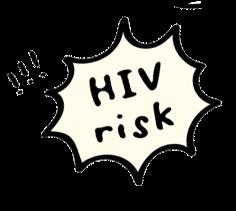



What are some ways that we reduce risk in everyday life?
Behaviors that contain risk:
• crossing the street
• driving a car
• riding a bike
• being in the sun
• baking cookies
Ways people reduce risk:
• looking both ways
• wearing a seatbelt
• wearing a helmet
• putting on sunscreen
• using oven mitts

Intro to Harm Reduction
Partnered sexual behaviors have an inherent potential for harm…
To minimize risks of sexual harm, people may:
• Limit their number of sexual partners
• Only have sex within a committed relationship , such as marriage
• Avoid sexual contact entirely (abstinence )

Risk is a part of life but we each have the right to make decisions about our own body and anything that affects our health.
The goal is not to eliminate all risk but to be aware and make choices that consider personal and community safety.

Intro to Harm Reduction
Partnered sexual behaviors have an inherent potential for harm… safer sex practices involve proactive communication about personal and relationship boundaries, including a plan to prevent STIs









are infections commonly passed through



Transmission
STIs are mostly passed through sexual contact with a person who already has an STI…
sex anal sex


genital skin-to-skin contact (even without penetration)

STI Transmission
SOME can also be passed through infected blood or other behaviors
• Sharing needles or injection equipment
• Sharing personal items (razors, toothbrushes, clothing, bedding, towels, etc.)
• Physical fighting
• Pregnancy, childbirth, or breastfeeding








STI Transmission
…either from contact with infected skin or sexual fluids: rectal fluid semen

vaginal fluid

















Signs & Symptoms
If left untreated some STIs can cause long - term damage to the body, such as cancer or infertility This means being unable to get pregnant or get someone pregnant
















































• Millions of people have died from AIDS-related illness due to lack of medical knowledge, research efforts, and funding
• Since the 80s, people living with HIV have faced stigma






Information for Teens (by MTV)

Find local HIV Testing Sites & Care Services
Risk Reduction Tool www.hivrisk.cdc.gov Find local PrEP Providers www.pleaseprepme.org



















ü



ü Ask questions about their past sexual experiences

ü Discuss your STI status

ü Create a plan to prevent STIs together




















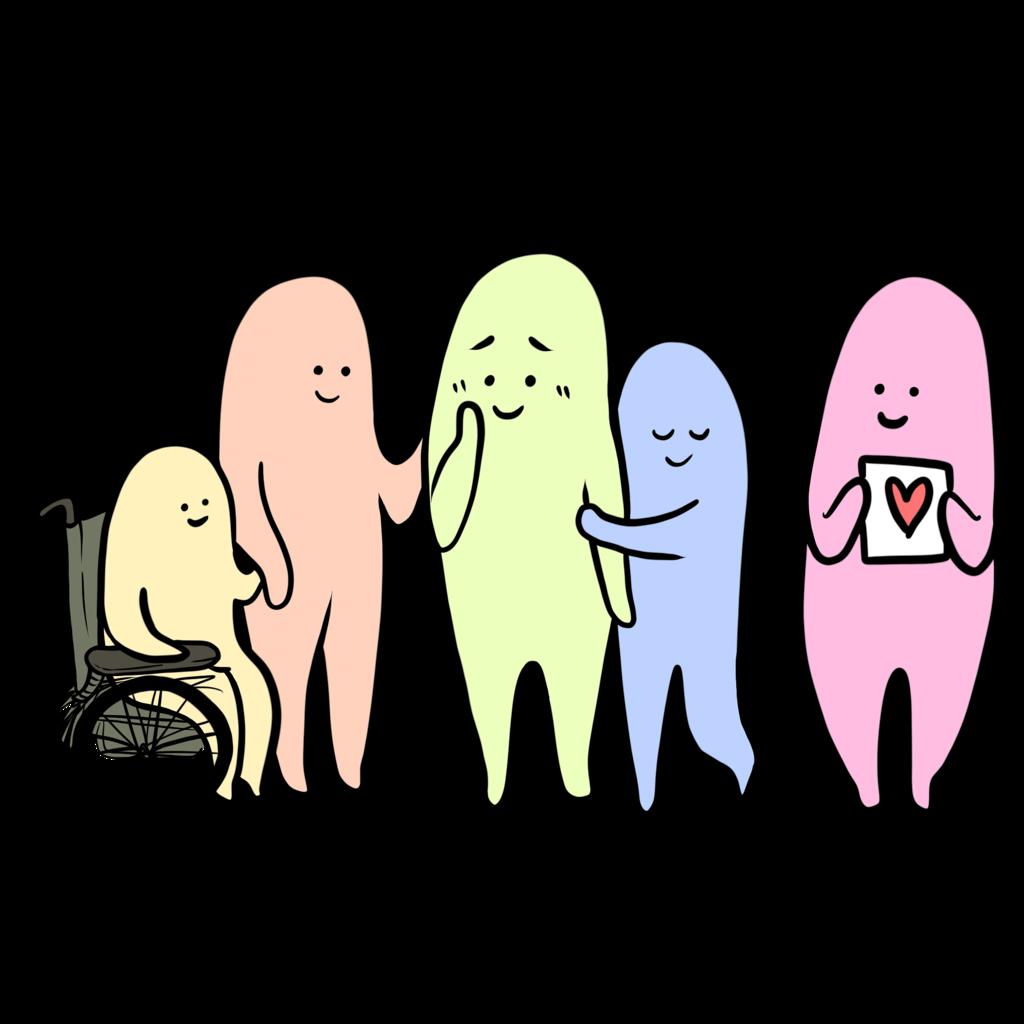

• Treat them with respect and dignity
• Include them in activities
• Listen to them
• Remind them to take their medication
• Go to their appointments with them
• Participate in an HIV/AIDS walk to fundraise for HIV research


Use your knowledge about STIs to complete an STI Crossword













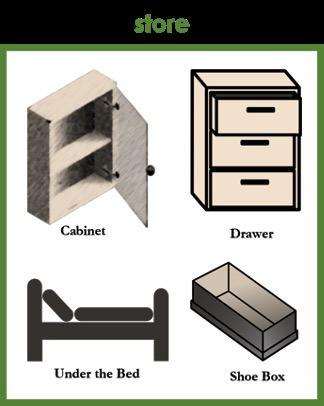

Condom Demonstration
Step 1: Ask for consent
Step 2: Check the package
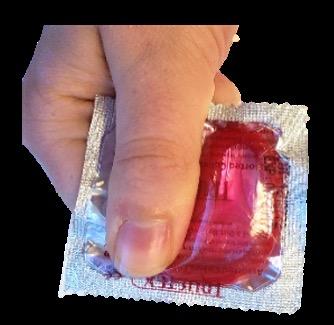


Condom Demonstration
Step 1: Ask for consent
Step 2: Check the package
Step 3: Open carefully
Step 4: Check the direction

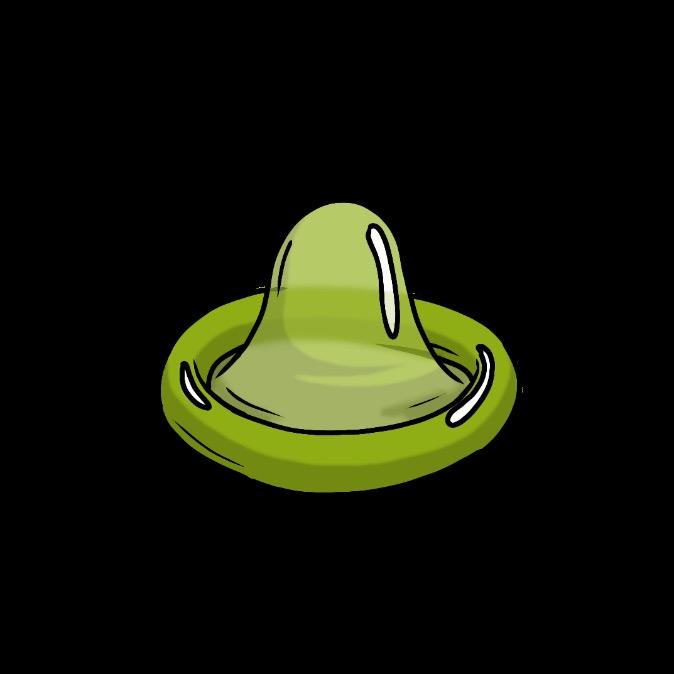



Condom Demonstration
Step 1: Ask for consent


Condom Demonstration
Step 1: Ask for consent
Step 2: Check the package
Step 3: Open carefully
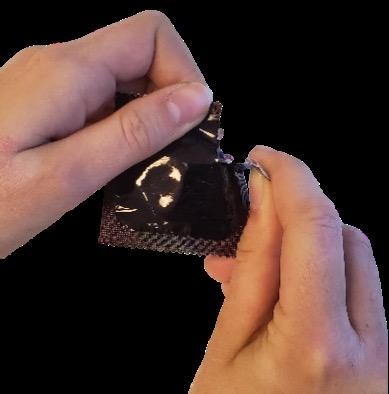

Condom Demonstration
Step 1: Ask for consent
Step 2: Check the package
Step 3: Open carefully
Step 4: Check the direction


Step 1: Ask for consent
Step 2: Check the package
Step 3: Open carefully
Step 4: Check the direction
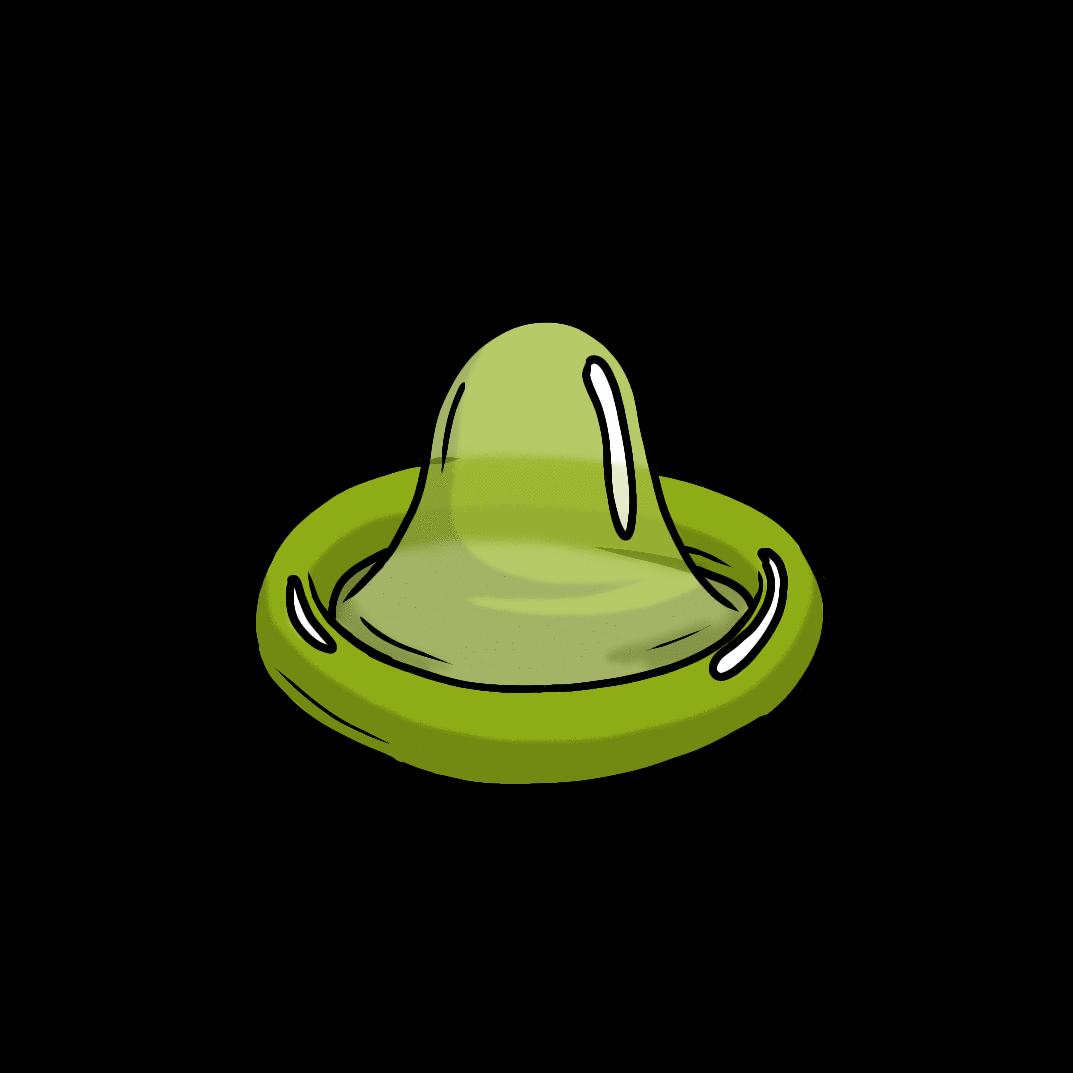

Step 1: Ask for consent
Step 2: Check the package
Step 3: Open carefully
Step 4: Check the direction
Step 5: Pinch the tip
Step 6: Roll onto erect penis


Step 1: Ask for consent
Step 2: Check the package
Step 3: Open carefully
Step 4: Check the direction
Step 5: Pinch the tip
Step 6: Roll onto erect penis
Step 7: Remove carefully
Step 8: Dispose in the trash


Step 1: Ask for consent
Step 2: Check the package
Step 3: Open carefully
Step 4: Check the direction
Step 5: Pinch the tip!


Step 1: Ask for consent
Step 2: Check the package
Step 3: Open carefully
Step 4: Check the direction
Step 5: Pinch the tip
Step 6: Roll onto erect penis
Step 7: Remove carefully


Step 1: Ask for consent
Step 2: Check the package
Step 3: Open carefully
Step 4: Check the direction
Step 5: Pinch the tip
Step 6: Roll onto erect penis
Step 7: Remove carefully
Step 8: Dispose in the trash









Place the steps for using an external condom into the correct order!
1. Groups will form a single-file line facing your stack of Condom Steps cards
2. The person at the front of the line can either:
• Pick a new card and place onto the board
• Remove a card that you believe to be incorrect
• Swap two cards into their correct order

Place the steps for using an external condom into the correct order!
3. After your turn, high five the next person in line to start their turn
4. The first group to get all 8 steps in order wins! Be careful: there are 8 correct steps, but 12 cards in the deck!

Step 1: Ask for consent
Step 2: Check the package
Step 3: Open carefully
Step 4: Check the direction
Step 5: Pinch the tip
Step 6: Roll onto erect penis
Step 7: Remove carefully
Step 8: Dispose in the trash

• Open with scissors
• Sharp objects (including teeth) should never be used to open a condom.
• Apply oil-based lubrication
• Oil causes latex to degrade and break. Lubricants made of oil should never be used with latex barriers.

• Rinse out and reuse
• Condoms are single-use medical devices. Reusing a barrier can cause it to break or spread infections.
• Flush down the toilet
• Condoms are not biodegradable. Flushing them down the toilet can create clogs and damage plumbing.


• What is the difference between curable and treatable STIs?
• How can a person protect themself from STIs?
• Where can people get free local STI testing?

Next class…
(content warning)
• Review consent and laws related to sexual crimes
• Analyze scenarios that depict aspects of sexual violence
• Explore strategies involved in human trafficking
Self-Care Ideas:
Bake some cookies
Run around the block
Help a family member or neighbor with a chore
Go to bed early



As we read through Bobby ’s story, we will be presented with options for what could happen next… The choices that we make will determine Bobby ’s path forward on the game board.


As we go through the game board, some squares will give us helpful reminders information about STIs… …others will ask important review questions that the class must answer correctly before we can move forward in the story.




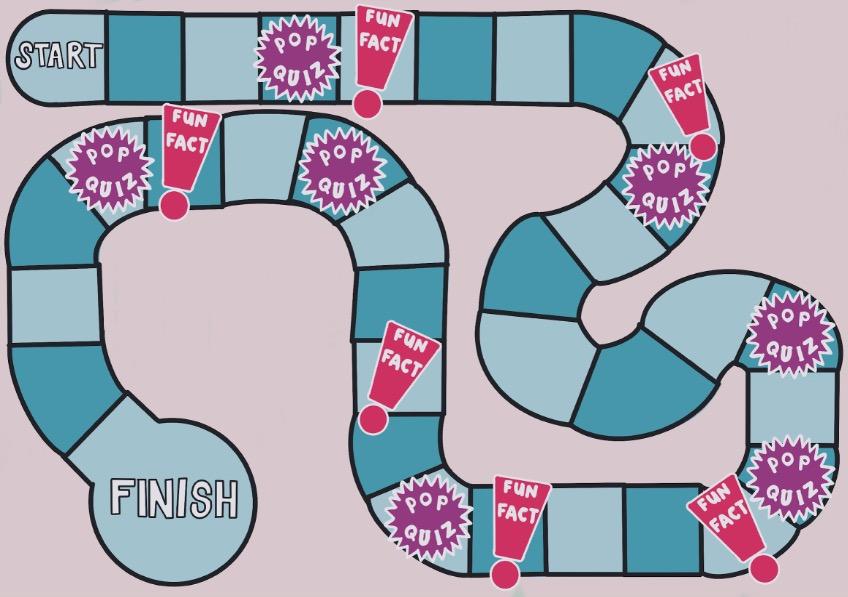









































































































Bobby the Blobby is a college student and works part - time. They have a crush on a coworker, AJ , who is really funny and sweet. One day while working together, Bobby and AJ decide to hang out after work…
They talk about their favorite movies and make plans to see a movie together.
B They talk about their current hobbies and make plans


Bobby and AJ meet at the movie theater and it quickly starts to feel like a date. Halfway into the movie, AJ rests their head on Bobby’s shoulder, and Bobby reaches their arm around AJ…
They cuddle for the rest of the movie and later walk home together holding hands.
B AJ looks up at Bobby and asks to kiss them. Bobby smiles and nods. They share a kiss.

Bobby and AJ meet at the bowling alley and it quickly starts to feel like a date
They laugh about how neither of them are very good at bowling, but they have a really fun time anyways…
They split a milkshake and play games in the arcade afterwards.
B AJ lets Bobby win and later gives Bobby a kiss goodnight.

The next day, Bobby feels nervous because they read on social media that you can get STIs from kissing . When they get to work, AJ informs Bobby:

Most STIs (including HIV) cannot be transmitted through saliva, but many can be passed orally through contact with infected skin.
Bobby is relieved and asks AJ for another kiss… Continue à

After a few months apart, Bobby flies out to visit AJ. They have a romantic dinner at AJ’s apartment and snuggle in bed together. They make out for a while, then after checking in with each other, they decide to have sex. But in the heat of the moment…
They accidentally put the condom on upside down, but quickly flip it over and put it on the right way before proceeding to have sex.
B They forget to use a condom.

Later that week, Bobby and AJ both want to go out again. After a few more dates, they talk about being in a relationship and also waiting to have sex until they both feel ready. As we know, STIs are typically passed through sexual behaviors, but some can also be passed in other ways…


AJ and Bobby date for a few months and they develop a strong, healthy relationship. But AJ graduates early and accepts a really good job offer in a different state. Bobby and AJ talk about their future together and decide…
They want to try being in a long-distance relationship.
not meant to be, so they break up.

Bobby is feeling down about their breakup and really misses AJ. To help distract themself, Bobby decides to have a self-care day and spend time doing things that make them happy…
Bobby stays in to relax. They take a bubble bath, do a face mask, and catch up with a friend on FaceTime.
Bobby goes out to get some fresh air. They pack some snacks, find a trail to hike, and enjoy a sunset picnic.

Later that night when AJ is asleep, Bobby remembers learning in health class:

Once a barrier touches the genitals, it can pick up STIs from the skin or sexual fluids. This means that flipping a condom over makes the barrier less effective.
Bobby also realizes that they never talked with AJ about their STI status before having sex…

The next morning, Bobby starts a conversation about STI protection and suggests that they both make appointments to get tested in a few weeks. However, AJ clearly has something else on their mind. AJ eventually tells Bobby that they have developed feelings for someone else and they think it’s best to end their relationship
Bobby is sad but appreciates AJ’s honesty. They agree to stay friends and spend the rest of the week together as planned.
B Bobby is heartbroken. They catch an early flight home and spend the rest of the week with their family.

Bobby bumps into a cutie named Mo walking their dog. They get to talking about their favorite bands and what they’re studying in school. They have a lot in common, and they both feel a spark of attraction
Bobby makes a flirty joke and invites Mo to join them for coffee so they can continue talking.
B Bobby asks for Mo’s number, so they exchange contact info then go their separate ways.

Later that night, Bobby is in bed and decides to masturbate.

Can a person get an STI from masturbating?
Bobby wakes up the next morning feeling relaxed and decides to go out for a smoothie…
Continue à

Over the next few weeks, Bobby starts to enjoy being single again. They spend time with friends, catch up on school assignments, and even decide to take on a new adventure
Bobby decides to train for a marathon and starts going for long runs through town every morning.
Bobby decides to adopt a senior dog and starts taking them to the dog park every morning.

They feel really comfortable with one another and begin to open up about their personal lives. Bobby talks about their recent break-up and Mo shares that they are living with HIV. Bobby is surprised. They want to ask Mo on a date but are unsure how Mo’s HIV status might affect their ability to be physically intimate…
Bobby asks Mo a few questions to learn more about HIV. Mo explains that they are still able to date and have sex as long as they are safe.
Bobby thanks Mo for sharing and later makes an appointment at the school’s health center to talk with a doctor about HIV prevention.

Bobby and Mo find themselves texting a lot over the next few days. Their conversations become intimate, and they start talking about their sexual interests. At this point, Mo shares that they are living with HIV Bobby is surprised. They want to ask Mo on a date but are unsure how Mo’s HIV status might affect their ability to be physically intimate…
Bobby asks Mo a few questions to learn more about HIV. Mo explains that they are still able to date and have sex as long as they are safe.
Bobby thanks Mo for sharing and later makes an appointment at the school’s health center to talk with a doctor about HIV prevention.

Mo and Bobby enjoy their beach day together, then Bobby takes Mo to their favorite sushi spot. After dinner, neither wants the date to end. They agree to go back to Bobby’s place and watch a movie. They get cozy on the couch, and things start to heat up…
They start making out, and after a few minutes, Bobby leans in and asks: “Should I grab a condom?”
B They kiss for a while, but Bobby pauses to say: “I want to be on PrEP if we’re going to have sex.”

Mo agrees and shares that they have been taking ART for the past 2 years.

Combining PrEP + ART + condoms = NO risk of HIV transmission
Remember, once a person reaches undetectable” viral load, untransmittable” through sex!
Bobby makes an appointment to get PrEP and decides to get tested for STIs too…
Continue à


Feeling confident with this new knowledge, Bobby asks Mo on a date. They make plans to go to the beach and then out for
Continue à

Mo gives consent and they agree to have sex. Afterwards, they realize that the condom broke How can a person lower their risk of contracting HIV after a potential exposure?

The next day, Bobby visits a local clinic to get PEP and decides to get tested for STIs too…
Continue à

A few days later, Bobby finds out that they tested positive for chlamydia from a previous partner. After talking with the nurse practitioner, Bobby learns that it’s a very common STI, especially for young people, and it’s easy to cure. Bobby leaves the clinic with antibiotics for themself and for Mo. Next time they get together…
Bobby asks Mo to have sex using a condom since they are now on meds.
Bobby and Mo agree to abstain from sex until the antibiotics are finished.

A few days later, Bobby finds out that they tested positive for gonorrhea from a previous partner. After talking with the nurse practitioner, Bobby learns that it’s a very common STI, especially for young people, and it’s easy to cure. Bobby leaves the clinic equipped with antibiotics and PrEP. Next time they get together…
Bobby asks Mo to have sex using a condom since they are now on meds.
Bobby and Mo agree to abstain from sex until the antibiotics are finished.


Mo and Bobby enjoy building their relationship without the pressure of having sex.
Over the next few weeks, they take turns planning fun dates that don’t involve sex…

Bobby and Q meet up at a local pizza joint later that night.

Sexual behaviors are not the only situations that require consent. It’s important to check in with people before unloading heavy emotions to see if they are in the right mental space to give support.
When they sit down, Bobby lets Q know that they have a lot of feelings about their breakup and asks Q if it’s OK to talk about it… Continue à

Mo kindly reminds Bobby:

A person must complete their treatment before a bacterial STI is considered “ cured .”
Mo and Bobby wait to have sex until they finish the course of antibiotics.
Over the next few weeks, they take turns planning fun dates that don’t involve sex…
Continue à

After dating for a few months, Bobby starts to notice that they have different values and are not as compatible as they thought. Bobby knows that they want to have kids eventually, while Mo doesn’t want to be a parent. They have an honest conversation about their future and decide to end the relationship…
Bobby needs to vent, so they call their friend Q to see if they are free to grab a slice of pizza and talk.
Bobby is sad about breaking up with Mo. Bobby’s friend Q offers to take them out for ice cream to cheer them up.

Q is a really good listener and offers Bobby some helpful advice about dealing with breakups. Q also talks with Bobby about what’s been going on in their own personal life. Q mentions that they have been causally dating two different people. Bobby doesn’t judge Q but wants their friend to be safe and happy…
Bobby asks Q: “When was the last time you got tested for STIs?”
Bobby asks Q: “Are you all on the same page about things?”

Q says that they don’t feel the need to get tested since they don’t have any symptoms. Bobby gently reminds Q that it’s important to know your STI status. Bobby also tells Q how they were surprised when they recently tested positive without having any symptoms…
Q realizes that they haven’t been tested in years and decides to make an appointment to find out their STI status.
Q tells Bobby that they have never been tested before and would like some support navigating the process for the first time.

After some honest conversations, Q learns that their partners are also seeing other people, and one of them has not been using condoms either. Q feels worried about their STI risk level and realizes that a mutually exclusive relationship would feel safer for them. To get a fresh start, Q decides to end things with both of the people they were dating…
Q wants to know their STI status before getting involved with anyone else, so they head to the walk-in clinic.
Q wants to get tested but is feeling nervous, so they ask Bobby to come with them to the health center on campus.
Q hasn’t talked with either person about their relationship boundaries or protection plans.

Name 3 questions that a person might want to ask someone before having sex with them.
Bobby helps Q think of ways to start the conversation with their partners…
Continue à

After Q gets tested, the nurse gives them a bag of STI barriers to take home and explains:


Barriers can be used for any type of sexual contact.
Internal and external condoms can be used during vaginal or anal sex. For oral sex or genital contact, a person with a penis can wear a condom or a person with a vulva can use a wearable barrier, like Lorals


As they walk into the health center together, Q feels grateful to have their friend’s support. Bobby explains that STI tests are free with Family PACT, and they help Q sign up. Both Q and Bobby get tested, and the nurse makes the entire process easy and comfortable… Continue

A few days later, Q gets their STI test results – it’s negative. Q asks Bobby to lunch to say ‘thank you’ for encouraging them to prioritize their health. Over the next few weeks, Bobby and Q start hanging out more often and they soon realize that they like each other
They decide to take it slow and not have sex until they both feel ready.
They quickly become sexually intimate, but they agree to use barriers during sex until Bobby can get tested again.

This experience brings Bobby and Q closer together and they start hanging out more often. They soon realize that they have feelings for each other and are both interested in a relationship, so they start dating. A few weeks later, they start talking about becoming sexually intimate…
They agree to have sex without a barrier since they both know their STI status and neither of them are seeing other people.
They both feel more comfortable continuing to use barriers for extra protection.

You helped Bobby through their college years and into a fulfilling career in the sexual health field. They now feel confident about their ability to prevent STIs in their future relationships, and they look forward to supporting others in making healthy, informed decisions

Bobby is about to graduate and is thinking about what they want to do after college. They reflect on all they have learned and all the experiences they have had over the past few years. They realize their passion for sexual health and decide that they want to help others…
Bobby applies to nursing school so they can help patients feel more comfortable when they come into the clinic for sexual health services.
Bobby takes a health educator job at their campus health center so they can help students learn how to take control of their sexual health.























Intro to Power Dynamics
Our society expects the individual to protect themself from harm… but “victim blaming” causes guilt and harm by diverting attention from the real issue:
Unequal power dynamics make it impossible for many people to avoid harm.

It’s everyone’s job to help reduce violence in our communities by staying aware of power dynamics and doing our best to balance them.


Race, class, and gender norms can socialize people to believe that they deserve
Laws and other systems are designed to enable them to retain their power while creating barriers for other people.

Intro to Power Dynamics
We cannot control what someone else chooses to do… We can only hold ourselves and each other accountable for treating people with respect.



In CA, we use an Affirmative Consent Standard to ensure that everyone has agency in sexual situations.
Waiting to hear “no” or “stop” is NOT affirmative consent. Sexual arousal is NOT affirmative consent.
This standard makes each of us responsible for being aware, checking in, and not taking advantage of others.

There are many laws designed to protect people from being touched or treated in certain ways without their consent
These apply to ALL people, whether they are strangers, friends, dating, married, etc.

The following behaviors are inappropriate and unacceptable (and illegal) because they are unwanted , disrespectful, and harmful.

If you need to talk to someone… no judgment, no shame




In California, Title IX requires that schools protect students and staff from gender-based discrimination:
• Sexual violence, coercion, or harassment





• Unfair treatment due to gender identity , expression , or sexual orientation
• Hostile learning or working environments

Any sexual communication that makes someone else feel uncomfortable

Name -calling or joking about someone’s body, experience, or identity Unwanted sexual comments , requests, or spreading rumors about someone



coercion, or harassment
This law requires that schools protect students and staff from gender- based discrimination : To learn more, check out: www.knowyourix.org

Any sexual communication that makes someone else feel uncomfortable
Whether it happens…
• in -person or digitally • directly or indirectly • on purpose or “ just kidding ” sexual harassment is never OK .
•
•
•
•



If we genuinely make a mistake and do or say something hurtful: ü take accountability ü apologize ü learn from it

• “Flashing” (exposing genitals or other private body parts)
• Taking, showing, or sending sexual pictures or videos
• Making someone touch their own body in a sexual way

This includes penetration of a vagina, anus, or mouth using a body part or an object

Human Trafficking
Forcing, tricking, or convincing someone to perform manual
Human Trafficking

Forcing, tricking, or convincing someone to perform manual labor or sex work

NOTE: If someone is doing sex work under age 18 they cannot be charged with sex trafficking
Sex trafficking – sexual services in exchange for money, drugs, or basic needs (food, shelter, etc.)

Child Sexual Abuse Material (Federal) – creating, viewing, or sharing nude or sexual images of a minor (under 18 years old)
Cyber Exploitation (CA) – sharing sexual images of another person without their consent, resulting in emotional distress
Sextortion (CA) – threatening to share or expose sexual images in order to get someone to do something


Human Trafficking
Forcing, tricking, or convincing someone to perform manual labor or sex work
Labor trafficking – work as repayment for a loan or service, or to avoid an unwanted consequence

Human Trafficking
Forcing, tricking, or convincing someone to perform manual labor or sex work
It may involve other sexual crimes, like harassment, assault, or creating child sexual abuse material…

The body may have a fight, flight, or freeze reaction, but regardless of a person’s reaction in the moment… NO ONE deserves to be exploited or harmed , and we are not responsible for anyone else’s decisions or behavior.








My uncle always invites his friends over to hang out at our house. Last weekend, one of them came up to me in private and said that I’m looking really grown and sexy. Then she looked down at my crotch and reached her hand over. I froze and didn’t know how to react…


3.


Marco is confused and upset about what his uncle’s friend did. He had an erection in the moment, but that didn’t mean he wanted her to touch him. Marco feels embarrassed and alone, like people would just brush it off if he tried to tell someone. He feels even more powerless when his girlfriend Jenna breaks up with him out of the blue. Marco decides to take back some control by getting revenge on his ex…

I can’t stand going to school anymore! A few days ago, I broke up with my boyfriend, and to get back at me, he sent a topless photo of me to all his friends. Now everyone at school has seen it and people keep staring and joking about me being a “slut”…

Jenna was humiliated and couldn’t believe that Marco would do that to her. She was so into him at the time, she wasn’t thinking about the risks of sending a topless pic, but now she regrets ever taking that photo. Jenna can’t stand the harassment but is worried that telling an adult will only get her in trouble. She feels powerless, and decides to take back some control by turning the spotlight onto another classmate…

1. Check in with Avery later. Acknowledge that what happened was not OK and ask how I can help.
2. Comment on the post to call out the transphobia. It’s not funny to joke about trans identity, and it’s none of our business what other people have in their pants anyways.
3. Nothing. Standing up for Avery might make me a target for harassment too.
4. Send Jenna a private message. Tell her it’s messed up and she should remove that post and apologize.
5. Tell an adult at school. They need to know what’s going on since Avery is getting bullied.

1. Not get involved. The situation involves nude images of a minor, so I don’t want to get in trouble too.
2. Talk it through with a trusted adult at home. Get their advice about what to do next.
3. Stand up to the students harassing Jenna. Tell them to knock it off, and that they need to delete that photo immediately.
4. Tell a school counselor. They could call in Marco and his parents to talk about what he did.
5. Ask Jenna how I can support her. Remind her that she doesn’t deserve to be harassed like this.

Yesterday during lunch, a girl in my class posted a meme making fun of trans people and tagged me in it. When our classmates started seeing the post, they were all shocked and started laughing, asking me if it was true. Then one person yelled “prove it!” and tried to pull down my pants…

Sexual violence is a community issue .
When one person experiences harm, there is often a ripple effect
But experiencing harm or exploitation does not give us an excuse to hurt others.

Sexual violence is NOT about sexual desire – it’s an act of power and control


one deserves to be harmed or exploited. Everyone deserves to feel safe and to have their body and boundaries respected.

• Remind them that it’s not their fault
• Listen without judgment and mirror their language
• Ask if they feel safe and how you can help
• Encourage them to report by telling a trusted adult, visiting a local hospital, or calling 911
• Empower then to make their own decisions

• Educate others about affirmative consent
• Do NOT make rape jokes or use violent or derogatory words
• Establish a code or signal to check in with our friends
• Take accountability when we harm others
• Call out situations where unequal

or cousin
or









Most violence – including sexual violence – is motivated by a desire for power and control.

People who commit harm often look for certain traits or situations to exploit

Forcing, tricking, or convincing someone to perform manual labor or sex work
Traffickers target those with an obvious vulnerability or need they can fulfill and often use grooming techniques to build a false sense of trust…
-733

Human Trafficking
Forcing, tricking, or convincing someone to perform manual labor or sex work
This modern - day slavery takes place all over the world, including our own communities…
An estimated 50 million people worldwide are victimized through human trafficking on any given day.
-733

Human Trafficking
Forcing, tricking, or convincing someone to perform manual labor or sex work

Forcing, tricking, or convincing someone to perform manual labor or sex work
“Gorilla” traffickers use force or threats to overpower “Romeo” traffickers use charm gifts, or romance to seduce “CEO” traffickers use money or business strategies to swindle
Trafficking Hotline: Text ‘HELP’ to 233 -733

Trafficking
Forcing, tricking, or convincing someone to do sexual things in exchange for anything of value
Human Trafficking Hotline: Text ‘HELP’ to 233 -733

Forcing, tricking, or convincing someone to do sexual things in exchange for anything of value
Sex traffickers will often intimidate , manipulate , or fake caring for someone to hide their exploitation by promising protection, love, money, or fame
Human Trafficking Hotline: Text ‘HELP’ to 233 -733

If a person is doing sex work under age 18, it is always considered sex trafficking
…but it’s not a young person’s fault for being in a situation like this!
It is the trafficker’s fault and a failure of society to protect that young person.
Human Trafficking Hotline: Text ‘HELP’ to 233 -733

Forcing, tricking, or convincing someone to do sexual things in exchange for anything of value
Traffickers are incredibly crafty … They may use social media and/or recruiters to target people and learn more about them
Human Trafficking Hotline: Text ‘HELP’ to 233 -733









When I started 7th grade, all my friends were really into this new video game. We couldn’t afford the latest game console, but my cousin gave me his old one so at least I could play online with my friends. It’s more fun when you can chat live with your teammates, so even if my friends were busy, I would always find someone online to team up with.
Human Trafficking Hotline: Text ‘HELP’ to 233 -733

One night I started playing with this girl, and she told me her name was Emma. Turns out she’s in 8th grade and we have a lot in common. We played online more often, and eventually she asked to add me on social media. Then we started messaging throughout the day, and it started getting flirty. Talking with her had become the best part of my week. Human

After school one day, I got a message from Emma that said “I have something special for you…” followed by a photo of her topless. I was surprised at first, but I guess that meant she was into me. She asked me to send one too, but I felt uncomfortable. What if my mom finds out? I told her that I can’t right now, and she was cool about it, but the next day she told me I owe her. I couldn’t think of another excuse, so I snapped a quick pic of my chest and sent it to her. I was nervous, but she told me I looked hot.
Human
65
We kept exchanging nude pics over the next few weeks and it became our little secret. Even though we hadn’t met in person yet, we decided to make things official. I told my friends about Emma, but not about the photos. I had never had a girlfriend before, and she made me feel so special. She even asked for my address so she could send me a gift – a brand new game console!


One morning, Emma mentioned that she had just bought herself a new phone. I asked her how she was buying all these expensive things, and she told me she had started selling her own nudes online to make some quick cash. She said she could help me out by selling some of my photos as well, but no one could find out. I needed the money, and I knew I could trust her, so I agreed.

At first, it was great to have the extra cash. But then I started to notice that Emma was acting different. Her messages were shorter and less flirty, and she stopped logging on to the game as much. She only seemed to care about getting more photos to make more money. Eventually she even stopped sending me money and kept making excuses about it.

Yesterday, the school counselor came in to talk to us about online safety. She mentioned how it’s not legal for people under 18 to be taking or sharing nude photos. I started wondering to myself what could happen if someone found out what Emma and I had been doing. Could I go to jail? I decided to tell Emma that I’m done selling photos. Human

This morning I woke up to three messages from Emma demanding more photos ASAP. I couldn’t believe she was acting like this! I thought that I knew her and that she really cared about me. Her last message said that if I don’t send her new pics today, she will expose all the photos I have sent. I’m so scared. She knows where I live. What should I do?

What are some of the
you noticed?
• Emma pressured Frankie to send nudes (child sexual abuse material)
• Emma paid Frankie for more photos (sex trafficking)
• Emma threatened to expose Frankie’s sexual images if they didn’t send more (sextortion)
Human Trafficking Hotline: Text ‘HELP’ to 233 -733


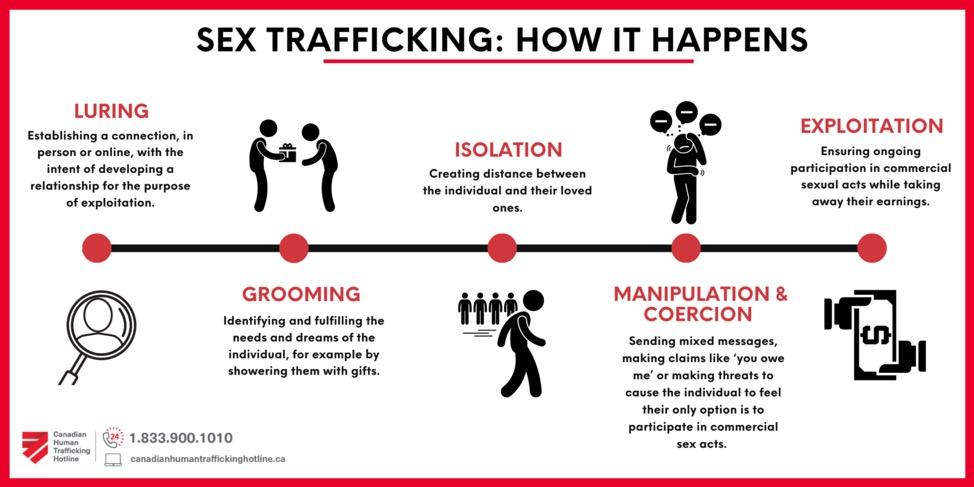








There were also some “pink flags” – things that may seem normal but when mixed with “red flags” become warning signs for harm or exploitation
• Frankie and Emma met online (no mutual friends)
• Frankie and Emma spent a lot of time messaging each other, eventually starting an “ official” relationship (even though they never met in -person or even talked on the phone)
• Emma sent Frankie an expensive gift
• Emma had Frankie’s address
Human Trafficking Hotline: Text ‘HELP’ to 233 -733

What are the vulnerabilities Emma took advantage of?
• Frankie is young and quick to trust
• They were excited to be getting a girl’s attention and to start their first relationship
• They also want things (a new game console) that they can’t afford
Human Trafficking Hotline: Text ‘HELP’ to 233 -733

How could Frankie have used technology more safely?
• Played online with friends they know in-person
• Not given their address to someone they met online
• Not shared nude photos
• Told a trusted adult when things started to make them uncomfortable



Do you think Emma is who she says she is? Meeting people online can be very risky
It’s easy for people to lie about their identity or pretend to be someone else



Technology and social media are making it easier than ever for traffickers to target and connect with young people.

What could Frankie do next?
• Reach out to the Human Trafficking Hotline
• Talk with a friend or classmate and ask for help
• Tell a parent or another trusted adult about what is going on
• Contact the police and report Emma

• We ALL have vulnerabilities
• Traffickers exploit vulnerabilities to gain power and control
• Everyone deserves safe relationships!





• It can be hard to leave a dangerous situation on our own…reaching out to a hotline or trusted adult can help


Let’s Review!
• What is CA’s affirmative consent standard?
• How is sexual violence a community issue?
• What resources can help people who are affected by sexual violence?

Relationships (content warning)
• Explore signs of healthy and unhealthy relationships, including types of abuse
• Analyze and categorize relationship behaviors as healthy, unhealthy, or abusive
Self-Care Ideas:
Practice some yoga poses
Cuddle with a pet
Write a poem or song
Do a random act of kindness












































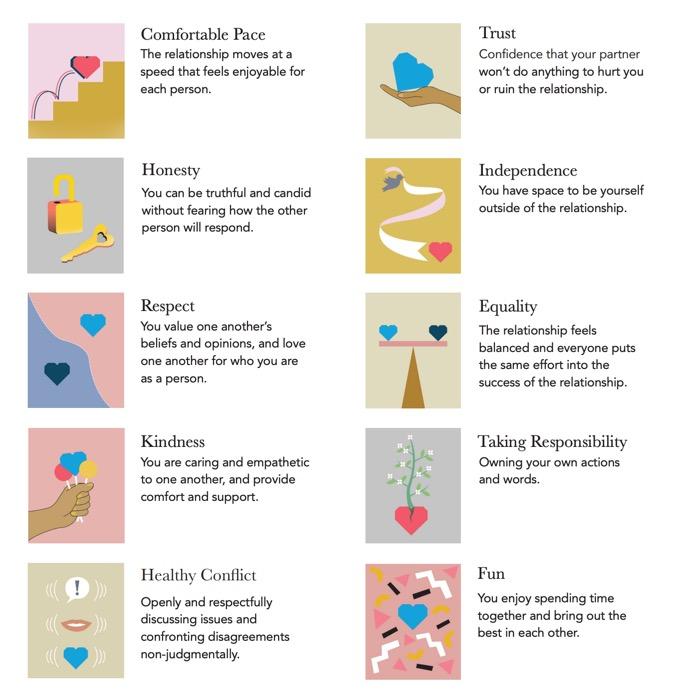
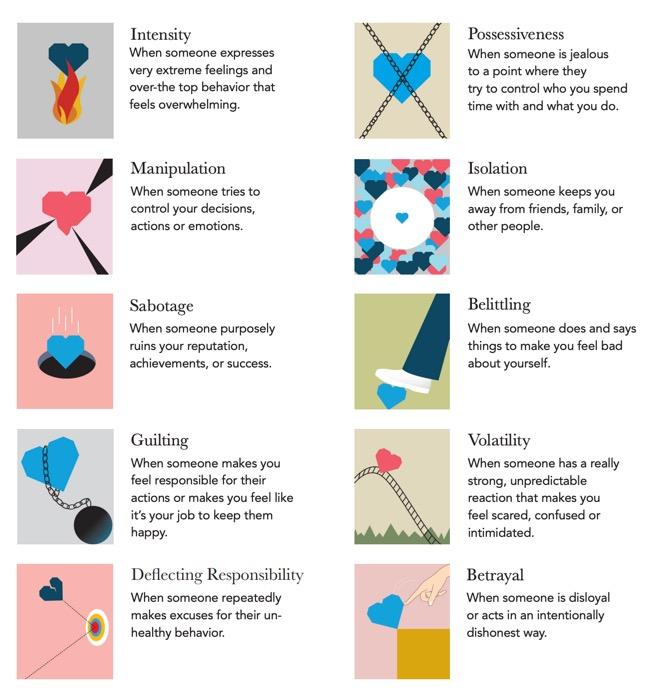






























The 10 unhealthy signs do not always indicate an abusive relationship … but they can become a pattern or ESCALATE to abuse over time.
are also certain behaviors that are considered abusive even if they only happen once


• Call: 1-800-799-7233
• Text: ‘START’ to 88788
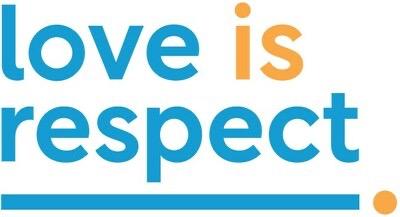

• Chat: thehotline.org (a project of the National DV Hotline)
• Call: 1-866-331-9474
• Text: ‘LOVEIS’ to 22522
• Chat: loveisrespect.org

Types of Relationship Abuse Physical harming or attempting to harm someone’s body

harming or attempting to harm someone’s body put-downs, name-calling, or humiliating someone threatening, intimidating, or isolating someone

Physical Emotional Psychological Financial
harming or attempting to harm someone’s body put-downs, name-calling, or humiliating someone threatening, intimidating, or isolating someone controlling someone’s money or access to resources

Physical Emotional Psychological Financial
harming or attempting to harm someone’s body put-downs, name-calling, or humiliating someone threatening, intimidating, or isolating someone controlling someone’s money or access to resources any sexual contact without affirmative consent

Physical
harming or attempting to harm someone’s body put-downs, name-calling, or humiliating someone threatening, intimidating, or isolating someone controlling someone’s money or access to resources any sexual contact without affirmative consent

Abuse can happen in any type of relationship
It affects people of ALL ages , cultures , and genders

Once a relationship becomes abusive, it usually cannot become healthy again

What can someone do if they realize they are in an unhealthy or unsafe relationship?
• Safely seek assistance (instead of handling it alone)
• Tell a trusted adult, family member, or friend about what is going on
• Meet with a counselor or therapist to process difficult emotions
• Call/text a hotline to get support and suggestions
22522

What can someone do if they realize they are in an unhealthy or unsafe relationship?
• Create a plan to safely end the relationship
• Consider whether it’s safer to talk in -person or digitally (via text)
• Practice communicating in firm, direct language
• Meet in a public place or bring a friend along in case the situation escalates
• After a break -up, stay distracted with friends, family, school, work, hobbies, etc.

There can be lots of complex reasons why people don’t “just leave” an abusive partner Blaming someone for staying in an abusive relationship further damages their self-esteem

• Remind them that it’s not their fault
• Listen without judgment and mirror their language
• Ask if they feel safe and how you can help
• Encourage them to report by telling a trusted adult, visiting a local hospital, or calling 911
• Empower then to make their own decisions

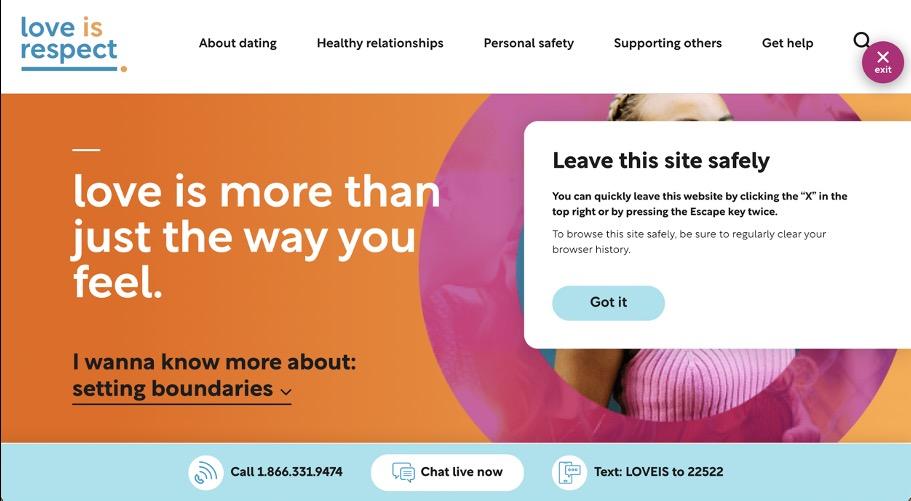















behaviors are clearly healthy or unhealthy
some can vary depending on the context, frequency, or other factors






when a person is hurt or controlled by their partner

Everyone deserves healthy and safe relationships
To learn more or get support, check out: www.loveisrespect.org A person who has experienced abuse is not at fault and not alone


• What are some signs of a healthy relationship?
• What are some signs of an unhealthy relationship?
• What are some online resources to learn more about relationships?

(content warning)
• Explore how media affects all aspects of culture – people, relationships, and society
• Discuss sexually explicit media (pornography), body image, and self-acceptance Self-Care Ideas:
Pick some flowers Visit someone you haven’t seen in a while














































Most media content is carefully manipulated, which can lead to unrealistic expectations
The way we engage with media can have real impacts on our relationships , mental health , and body image

• Mainstream media (movies & ads)
• Social media (influencers & editing apps) • Sexually explicit media (pornography)

• Personal experience (past relationships)
• Observing family relationships (parents, siblings)
• Observing peers’ relationships (couples at school) • Learning about healthy relationships in Teen Talk • Watching couples




1. Watch the movie clip
2. Be on the lookout for media techniques, unrealistic elements, and ‘ red flag ’ behavior
3. Discuss the messages about relationships portrayed in the clip

1. Does this chance encounter seem realistic? Why or why not?
2. What visual cues or film techniques (e.g., lighting, music, camera angles) are used to emphasize the romance?
3. How do we see gender stereotypes reinforced in this scene?
4. If an ET watched this clip, what would they learn about how to meet a potential romantic partner?


1. How can you tell that the characters wanted (or did not want) to kiss? Was it consensual?
2. What strategies did the characters use to get what they wanted? Was their communication healthy or unhealthy?
3. How did it convey to the viewer that the kiss improved their relationship?
4. If an ET watched this clip, what would they learn about initiating a first kiss?


• The “Meet Cute”
• The “Big Ask”
• The First Kiss
• The Grand Romantic Gesture The Betrayal
• The Breakup
• The “Catfish” The Pretend Relationship Turns Real

1. What behaviors did you notice? Are they more healthy or unhealthy?
2. What strategies did the characters use to get what they wanted? Did they show respect for each other’s wishes?
3. What is this scene communicating about consent?
4. If an ET watched this clip, what would they learn about asking someone out?


1. What behaviors did you notice? Are they more healthy or unhealthy?
2. What is the grand romantic gesture supposed to mean? Why is the character using this strategy?
3. What visual cues or film techniques are used to illustrate romance?
4. If an ET watched this clip, what would they learn about using grand romantic gestures?
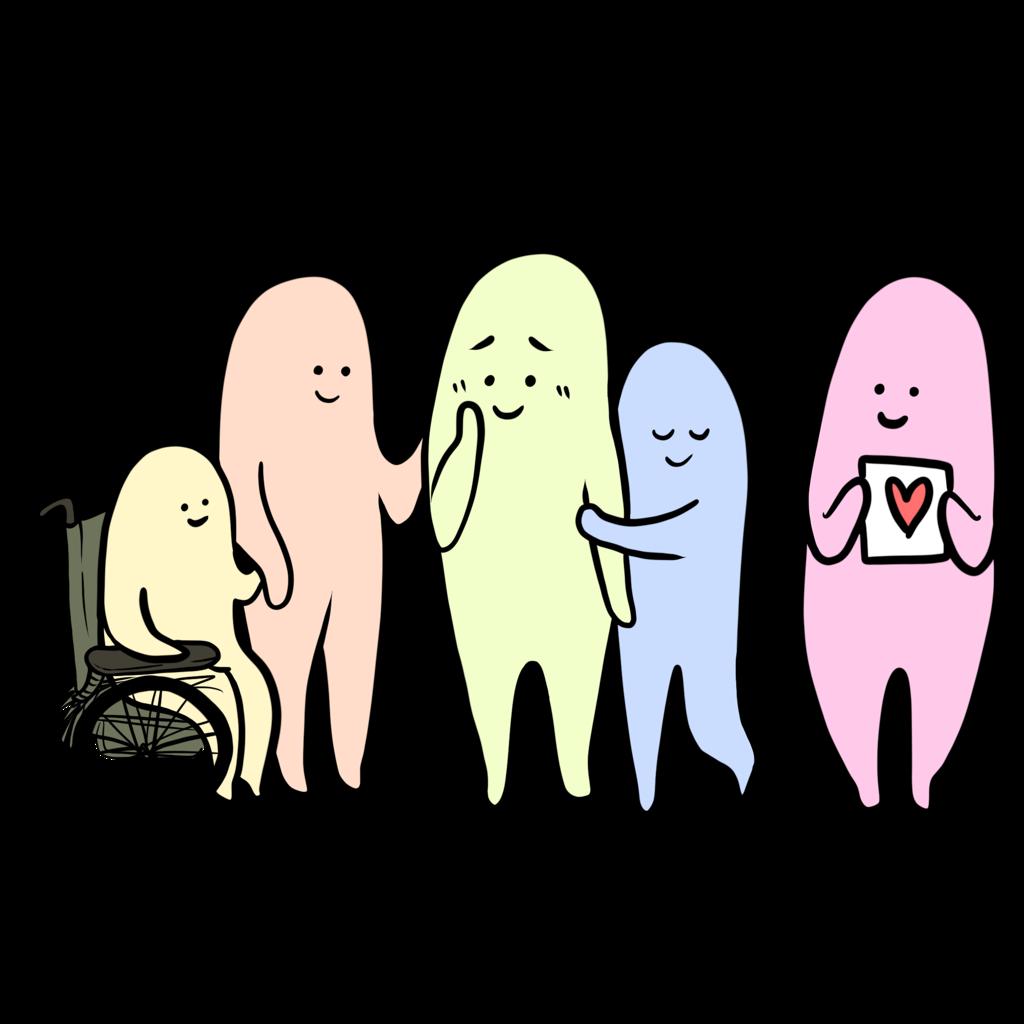

1. What behaviors did you notice? Are they more healthy or unhealthy?
2. How do the characters deal with betrayal? How could they have responded in healthier ways?
3. If an ET watched this clip, what would they learn about dealing with betrayal or a breech of trust?


1. What behaviors did you notice? Are they more healthy or unhealthy?
2. How do the characters break up? How could they have handled the situation in healthier ways?
3. What is the scene communicating about jealousy in relationships?
4. If an ET watched this clip, what would they learn about breaking up with someone?


1. What strategies did the characters use to get what they wanted? Are they more healthy or unhealthy?
2. How can pretending to be someone else affect affirmative consent?
3. What visual cues or film techniques are used to emphasize romance?
4. If an ET watched this clip, what would they learn about catfishing a potential partner?



1. What did you notice about their communication? How do they negotiate their boundaries?
2. What choices are they making? Are they more healthy or unhealthy?
3. What clues are used to foreshadow that they will fall for them in the end?
4. If an ET watched this clip, what would they learn about agreeing to be in a pretend relationship?


What do you think are some of the most challenging aspects of navigating romantic relationships ? (e.g., compromise, building trust, dealing with conflict)
How are these moments typically presented in mainstream media?


How many examples of consent did we see in these clips?
Why do you think consent conversations are not commonly depicted in romantic scenes?

What else is missing from these clips?

• Racial diversity – Black, Latinx, Asian, and Indigenous lead actors
• Gender & sexual diversity – LGBTQIA+ actors & characters
• Neurodiversity of actors & characters
• Diversity of body types

People tend to get unrealistic expectations from popular media because it commonly
• Romanticizes unhealthy and even abusive relationships
• Portrays characters who prioritize love or a partner over other parts of their life (school, friends, family, etc.)
• Skips over the build -up of trust and discussions of boundaries
• Fails to provide models of affirmative consent – even depicting nonconsensual behaviors as funny or cute

So far, we have been analyzing media messages about romance and dating …but there are also lots of messages about sex and sexuality in the media.









Any type of media that depicts people in sexual situations, created with the intent to arouse

Also known as “pornography ” or porn

Based on several different research studies, young people of all genders said they watched porn because of…


Analyzing Pornography
Who is the assumed viewer?

the way media represents the world and women from a masculine point of view, often depicting women as objects of male pleasure

Analyzing Pornography
Who is the assumed viewer?
Porn is an adult interpretation of sexuality made for entertainment – not education!
It’s designed for people with adult bodies, adult brains, and adult perspectives…

Pornography
People tend to get unrealistic expectations from pornography because it commonly
• Communicates ideas about how partners should act in sexual situations
• Normalizes disrespect and even violence
• Misrepresents how people know what their partner wants or likes
• Depicts consent as assumed or unimportant

Much of what we see in the media is intended to get viewers to buy –or buy into – what they are selling



It’s important to be able to recognize the tactics being used to draw in consumers…

Things to consider:
• How this product or idea aligns with your personal values and priorities All media is created by an author with a particular goal or agenda…
• Purpose of the message (is it informational? persuasive? entertainment?)
• Motive of the author (for education? power? profit?)

Media Analysis Questions





Media Analysis
How are they selling it?
• How effective their strategies are Companies have a lot of data about what appeals to consumers… Things to consider:
• The intended audience
• How they are trying to connect with consumers (using humor? creating shock value? featuring celebrities?)

Media Analysis Questions












Media Literacy
The ability to analyze , evaluate , and create media using a critical lens
• Think critically
• Become smarter consumers of products and information
• Recognize points of view It empowers us with the skills to:
• Understand author goals
• Identify the role of media in our culture
• Create media responsibly

The ability to analyze , evaluate , and create media using a critical lens
Why is it important to develop media literacy?

Communicating digitally rather than in-person does not make bullying or hate speech OK. Our online presence forms a “digital tattoo” that can be difficult to remove or change...
Before posting, sharing, or communicating online, try to stop and THINK: Is it True?
Is it Helpful? Is it Inspiring? Is it Necessary? Is it Kind?














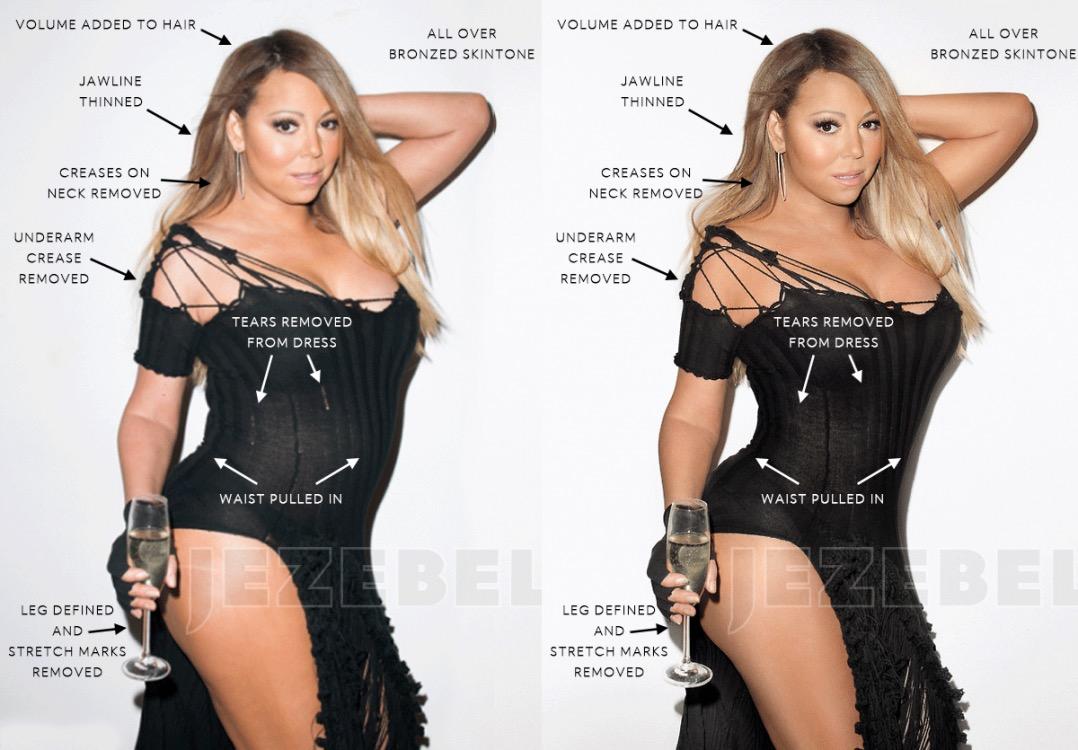














We’re going to reflect on some statements related to body image :
• Read through the list of statements and mark ‘Yes’ or ‘No’ based on whether it’s true for you
• Do not write your name on this worksheet
• Only use blue or black pen or pencil
• When you’re done, flip the page face-down









It’s not always easy to have positive feelings about our body or appearance. but it’s important for our mental health & well-being to develop resiliency! Everyone has moments when they feel unhappy or insecure about their looks…

for Healthy
of focusing on how you look




• Great at giving advice • A supportive friend • A good role model




Appreciate what your body (and brain) does for you! like keeping you alive, safe, able to grow & learn new things
Follow people on social media who inspire you… Unfollow anyone who makes you feel badly about yourself.









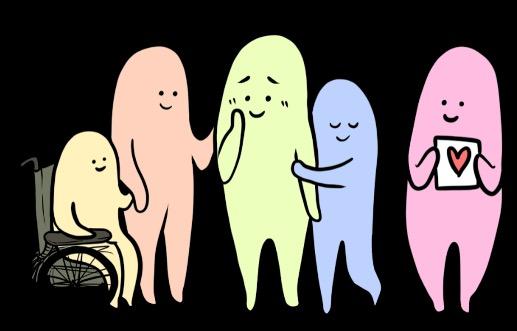





We are always growing and changing !
Our self-image and relationship with our body will continue to evolve as well…
We may feel critical at times, but we can always love and respect ourselves.


• Why is media literacy important?
• How does media affect body image
• How can we handle consuming

Next class…
• Learn how to express refusal
• Discuss healthy ways to dealing with rejection
• Practice communication and negotiation skills using scenarios
Self-Care Ideas:
Have a picnic
Take a break from social media
Climb a tree
Listen to a guided meditation







































•





•


You and your partner have been dating for two months now and you’ve started to get closer. You two have shared a couple of kisses, but never in front of other people. You are uncomfortable with PDA (public displays of affection) and are worried that your partner wants to kiss you in front of your friends. Use the Be FIRM model to talk to them about why you are uncomfortable with PDA.

“Hey, can we talk for a second? I wanted to let you know that I’m uncomfortable kissing in front of other people. I think those moments are private, and I wouldn’t want to make anyone else uncomfortable either. We can still kiss when we’re alone, but let’s just stick to holding hands when we’re around our friends. That way we can still feel connected without so much PDA. How does that sound?”

“Hey, can we talk for a second? I wanted to let you know that I’m uncomfortable kissing in front of other people I think those moments are private, and I wouldn’t want to make anyone else uncomfortable either. We can still kiss when we’re alone, but let’s just stick to holding hands when we’re around our friends. That way we can still feel connected without so much PDA. How does that sound?”



“Hey, can we talk for a second? I wanted to let you know that I’m uncomfortable kissing in front of other people I think those moments are private, and I wouldn’t want to make anyone else uncomfortable either. We can still kiss when we’re alone, but let’s just stick to holding hands when we’re around our friends. That way we can still feel connected without so much PDA. How does that sound?”

“Hey, can we talk for a second? I wanted to let you know that I’m uncomfortable kissing in front of other people I think those moments are private, and I wouldn’t want to make anyone else uncomfortable either. We can still kiss when we’re alone, but let’s just stick to holding hands when we’re around our friends. That way we can still feel connected without so much PDA. How does that sound?”

“Hey, can we talk for a second? I wanted to let you know that I’m uncomfortable kissing in front of other people I think those moments are private, and I wouldn’t want to make anyone else uncomfortable either. We can still kiss when we’re alone, but let’s just stick to holding hands when we’re around our friends. That way we can still feel connected without so much PDA. How does that sound?”

Sometimes speaking up in the moment is scary or unsafe
It’s OK to leave the situation and find an adult for support. They may give you advice for next steps or, if needed, take action on your behalf.






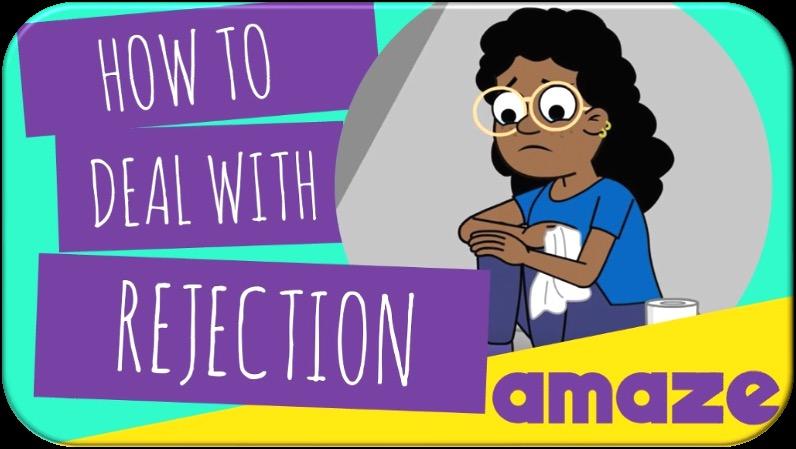



During intense moments or times of conflict, our body sends us signals
• Heart may beat faster
• Stomach may feel tight
• Hands may become sweaty
• May feel a weight on the chest
• May feel confused or “out of sorts”








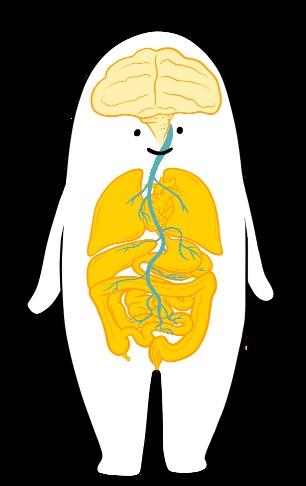



Can be helpful to…
• Repeat back what they said to make sure you understand
“That’s hard for me to hear, but I understand that you already have a date.”
“It sounds like you need more time to feel comfortable. Thank you for letting me know.”


AFFIRM
Accept their decision Feel your Feelings
Ask yourself…
• What emotions do I feel?
• Why am I feeling this way?
• Who can I talk to for support? Your feelings are VALID!


Accept their decision Feel your Feelings Increase self-care Reframe We might naturally think… “They must hate me.”

AFFIRM
Accept their decision Feel your Feelings Increase self-care Reframe Move forward
Ask yourself…
• Did I make them feel uncomfortable? If so, what can I do to make it right?
• What could I do differently in the future?
• Who can I talk to for support?
• What am I proud of myself for?

AFFIRM Accept their decision Feel your Feelings Increase self-care
For example:
• Go for a walk
• Listen to music
• Meditate or read
• Do something you enjoy (painting, cooking, sports)
• Talk to someone you trust


AFFIRM Accept their decision Feel your Feelings Increase self-care Reframe
We might naturally think… “They must hate me.”
Instead, try thinking…
“They must trust me enough to be honest with me.”

You and your partner have been dating for two months now and you’ve started to get closer. You two have shared a couple of kisses, but never in front of other people. You are so excited about dating them and want everyone to know! Your partner just told you they don’t want to kiss in front of other people. Your feelings are hurt – don’t they like you? Think about the different strategies for dealing with rejection and use the AFFIRM model to respond to your partner in a respectful way.

“Thank you for letting me know how you feel. I’m just so happy to be with you that I sometimes forget how PDA can make others uncomfortable. Holding hands in public and kissing in private is a good compromise though. I’m glad you brought this up so we can be on the same page going forward.”





You are so excited about your birthday pool party next weekend! A lot of classmates have already told you they are coming, but you haven’t gotten a straight answer from your best friend yet. When you ask them, they seem uncomfortable and tell you they’re not going to come. You’re really disappointed – they are your best friend! Use the AFFIRM model to accept their decision and move forward in a healthy way.



You have recently noticed some changes in your body. You know these are normal puberty changes, but your family has been making comments that make you a little self-conscious. Your best friend just invited you to their birthday pool party and you’ve heard that a lot of other classmates are going. You don’t feel comfortable with the idea of being in a swimsuit in front of all those people. Use the Be FIRM model to let your friend know that you aren’t comfortable going to their pool party.




You have been struggling in science class and want to improve your grade. Your best friend is in the class too and always tries to make you laugh with little comments and jokes. You know that you need to pay attention in class so that you’ll do better on the next test, but it’s hard to ignore your friend when they always want your attention. Use the Be FIRM model to explain your situation and set some boundaries with your friend.

Science is your favorite class because you get to sit next to your best friend. You love joking around with them and making them laugh. Today after class, they told you they don’t think you should sit together anymore. You’re surprised and a little sad that you won’t be able to have fun with them in class anymore. Use the AFFIRM model to respond to them in a respectful way that accepts their boundaries.










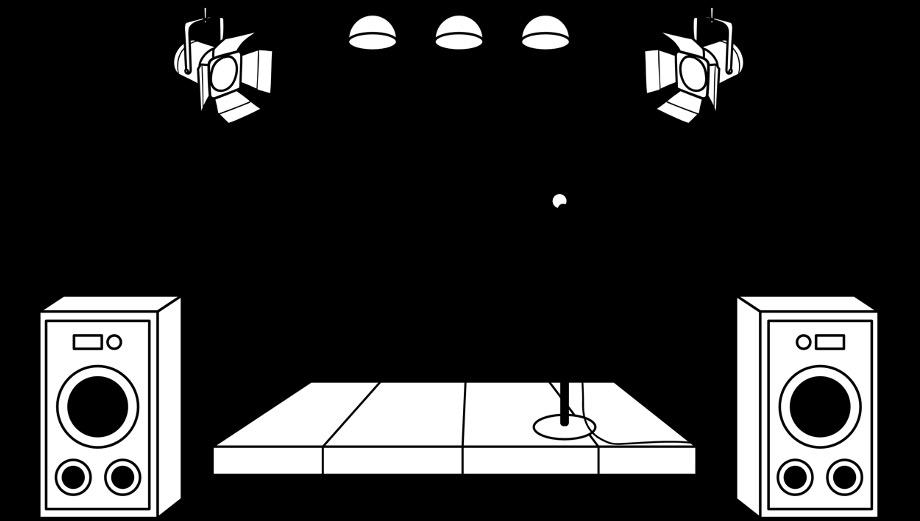




• Reflect on personal goals for the future and how the information from Teen Talk can help reach those goals
• Play a review game!
• Take the Exit Survey
Self-Care Ideas:
Play a board game with a friend or sibling
Create a comic strip Go swimming
Watch your favorite show or movie


Review!
• What is the Be FIRM model? Which steps are optional?
• What are some kind ways to turn someone down?
• What are some healthy ways to deal with difficult emotions?














































My current mile time is 12 minutes and I can train to increase my speed and endurance Set realistic goals that challenge you but are still possible to accomplish:






Ensure that your goal is aligned with your values and vision for your future:
Working towards this goal will increase my fitness and help me to stay healthy






Set a clear deadline and track your progress along the way:
I have 6 months until the end of the year and can aim to reduce my time by 10 seconds each week






Measurable Achievable Relevant
SMART Goals I am going to run a 10-minute mile without stopping by the end of the year.

Setting SMART Goals – Your Turn!





Yuki is in eighth grade and hopes to go to college after graduating high school. She is really into soccer, but her grades are not where they used to be since she joined the soccer team. She doesn’t want to quit soccer because it has improved her physical and mental health, but she needs to find a better balance to keep her grades up. Help Yuki create a SMART goal to boost her grades this year.

Consider your values, goals, and all we have discussed throughout Teen Talk to envision and illustrate your future!
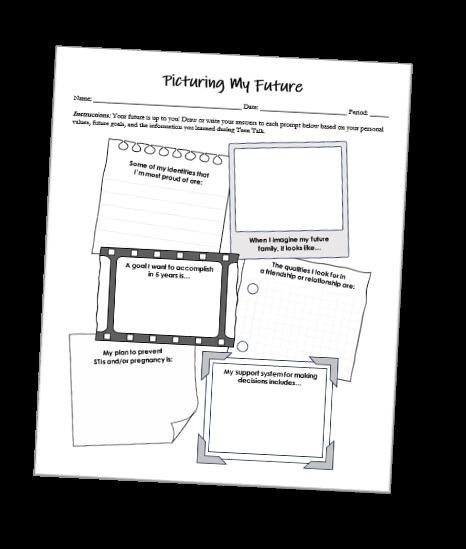















• What is something you will remember from Teen Talk?
• What was your favorite part of this course?
• How could Teen Talk be improved for the future?

Forward
information from Teen Talk can help you:
• Make informed decisions about your sexual health & relationships
• Advocate for yourself and others
• Get the support you need to reach your goals for the future
Give someone a hug Volunteer in your community
